
Title: Her Majesty the King
A romance of the harem
Author: James Jeffrey Roche
Illustrator: Oliver Herford
Release date: January 22, 2025 [eBook #75179]
Language: English
Original publication: New York: R. H. Russell, 1898
Credits: Bob Taylor, David Edwards and the Online Distributed Proofreading Team at https://www.pgdp.net (This file was produced from images generously made available by The Internet Archive)


Her Majesty the King

HER MAJESTY
THE KING
A Romance of the Harem
Done into American
from the Arabic
By
JAMES JEFFREY ROCHE
With Illustrations by
OLIVER HERFORD
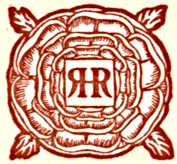
NEW YORK
R. H. RUSSELL
1902
Copyright, 1898, by
James Jeffrey Roche
Copyright, 1902, by
Robert Howard Russell
UNIVERSITY PRESS · JOHN WILSON
AND SON · CAMBRIDGE, U.S.A.

To the lineal descendant of the Lady Kayenna, who told me this true history, the while I could but marvel and admire the teller; for, of a truth, since Scheherezade there hath been none to approach her in goodliness and wit and wisdom and all comeliness of mind and person and, especially, in a proper and intelligent appreciation of
THE ILLUSTRIOUS AUTHOR.
[Pg v]

Many, and in sooth foolish, are they who writing books send them forth to the world with humiliating disparagement of their contents and servile appeals for mercy to those who may read them. Now a man who hath dates, or coffee, or rice to sell goeth not into the market-place crying out, “Lo! the merchandise which I offer for sale is poor and mouldy and unworthy stuff; yet of your charity, good people, I pray you to buy,” seeking yet to cajole his hearers with coarse flattery. As if any man were silly enough to buy damaged goods because, forsooth, the vendor praised the good judgment of the buyer!
I, who have made the pilgrimage and kissed the Kaaba which endowed with truth, am not as the Franks who trust to the beguilement of the Stone of Bel-Ârni. This volume, containing the surprising adventures[Pg vi] of the good Kayenna and the marvellous wisdom of Shacabac, the Wayfarer, needeth no apology. If it excelleth all other works of history in lofty thought, in rich imagery, in polished style, and in perfect diction, it is only because I have made it to do so. Had it existed in the days of the good Caliph Omar, wisest of all censors, it would not have shared the fate of that mass of unworthy literature by him justly condemned to the flames. Rather would it have been commended to all the faithful as a work not to be hastily skimmed by the light and thoughtless who seek transitory knowledge in the public libraries, but to be bought and preserved for careful and frequent study by the discriminating reader.
While the work of no mortal is perfect, the only defect in this book is its brevity. Its merits are as many as its words. If any man fail to recognize them, let him wisely be silent, and, returning the book to him from whom he borrowed it, pray Allah for better judgment and mourn the hour in which he, unworthy, ever learned to read.
[Pg vii]

| PAGE | |
| FOREWARNING | v |
CHAPTER I. |
13 |
| He that repenteth too late may some time worry too soon.—The Kâtâmarana. | |
CHAPTER II. |
20 |
| A lie grows so fast that its own parents may not recognize it.—Deucalion. | |
CHAPTER III. |
29 |
| The hardest thing to find is an honest partner for a swindle.—Samith. | |
CHAPTER IV. |
34 |
| A grandfather is a man who has two chances to make a fool of himself, and seldom neglects them.—Ginglymus. | |
CHAPTER V. |
46 |
| An omen, said the Fakir, is a sign of the future. Blame not the omen, but the future, if the sign prove not true.—Shiraz, the Younger. | |
CHAPTER VI. |
55 |
| The man who can invent a good working substitute for honesty has yet to be invented himself.—Eastern Proverb.[Pg viii] | |
CHAPTER VII. |
61 |
| Nevertheless, much depends on a man’s horoscope. One is born in the desert, and becomes a brigand; another is reared in the great city, and publishes books. It is Kismet.—Ben Haround. | |
CHAPTER VIII. |
72 |
| What is a cryptogram? asked the Pupil. It is a cipher, replied the Sage. What is a cipher? persisted the Pupil. It is naught, answered the Sage. Is there a cryptogram in this book? asked the Pupil. If there be, a Sage alone will find it. It should explain aught that may seem irrelevant.—The Wisdom of Shacabac. | |
CHAPTER IX. |
88 |
| There are times when it is inexpedient, if not actually immoral, to kill the bediamonded clerk of a caravansary.—Manco Capac. | |
CHAPTER X. |
95 |
| Surely, thou dost not expect strangers to pay for thy books. And, surely, thou wouldst not ask thy friends to buy them. Seek some other way of achieving wealth through letters. And let me know if thou findest it.—The Pauper Poet. | |
CHAPTER XI. |
106 |
| Some men borrow books; some men steal books; and others beg presentation copies from the author.—Ben Haround. | |
CHAPTER XII. |
122 |
| In time of war begin to prepare for it.—The Compleat Art of Logistics, by Yang Kee.[Pg ix] | |
CHAPTER XIII. |
129 |
| Every nation has just the government for which its people are fitted; at least, that is what is said by the rulers who are piously engaged in misgoverning it.—Manco Capac. | |
CHAPTER XIV. |
136 |
| This Book is a Mirror wherein the Wise Man seeth Wisdom, but the Fool seeth Folly.—Shacabac. | |
CHAPTER XV. Lagniappe. |
142 |
[Pg x]

| Her Majesty the King | Frontispiece |
| “‘In what way?’ asked his wife” | Page 14 |
| Al Choppah | 22 |
| Shacabac, the Sage | 40 |
| Ben Zoin | 62 |
| “‘I bring evil news!’” | 104 |
| Badeg, the Soothsayer | 108 |
| “‘Out of this, fortune-telling dog!’” | 118 |
[Pg 13]
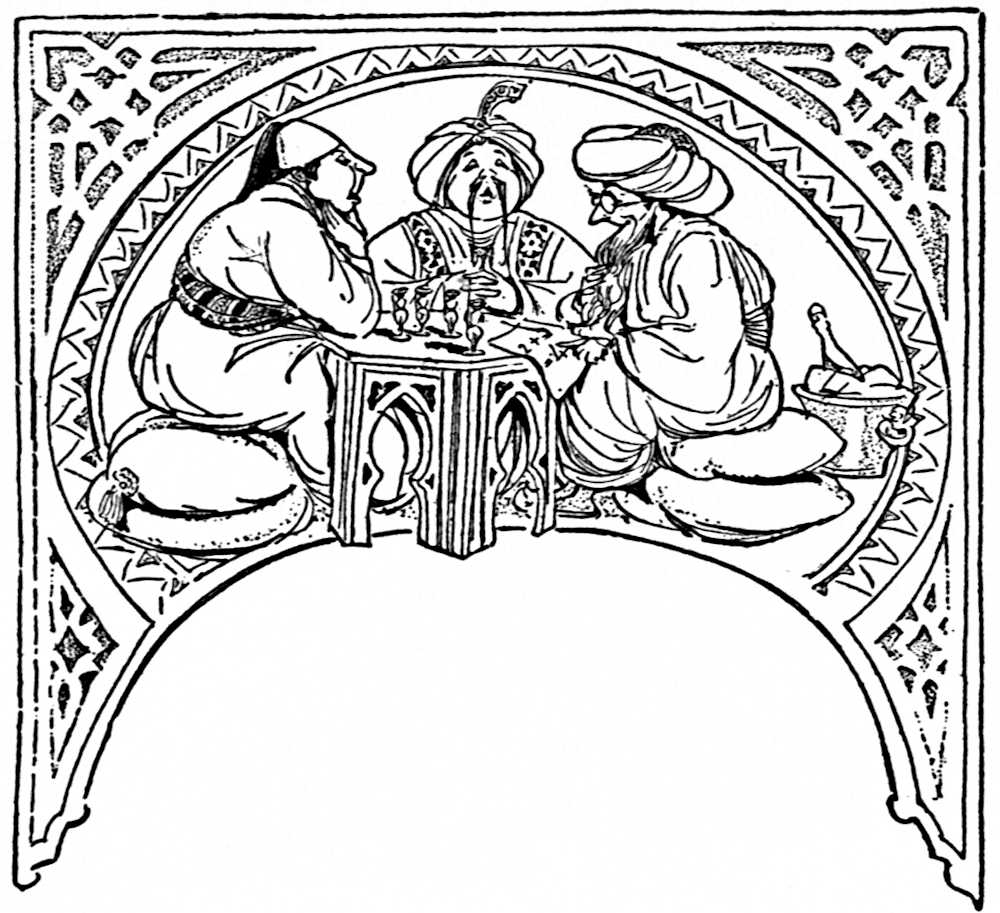
The Pasha Muley Mustapha was unhappy. He was a peaceloving, easy-tempered man, as Pashas go, and, when allowed to have his own way, was never inclined to ask for more. But now, after seven years of wedded life, he found his wishes thwarted, not for the first time, by the caprice of a woman, and that woman his only wife, Kayenna, well surnamed the Eloquent. The misunderstanding had arisen, innocently enough, in this way:—
[Pg 14]
“I think, my dear,” said Muley Mustapha, as he sat smoking his nargileh one day at the beginning of this history, while his wife reclined on a divan,—“I think, my dear, that my parents (may their memory be blessed!) made a great mistake in their treatment of me in my youth. I was brought up too strictly. They gave me no opportunity of seeing life in all its phases. Consequently, I find myself, in middle age, almost a stranger among my own subjects. I mean to adopt an entirely different system with little Muley.”
“In what way?” asked his wife, rising on her elbow, and casting a suspicious look at her lord.
“Well, in this way,” replied Muley Mustapha, deliberately,—“in this way. I intend to let him go out into the world, mingle with the youth of his own age, share in their sports, and, as the Giaours say, ‘sow his wild oats.’”
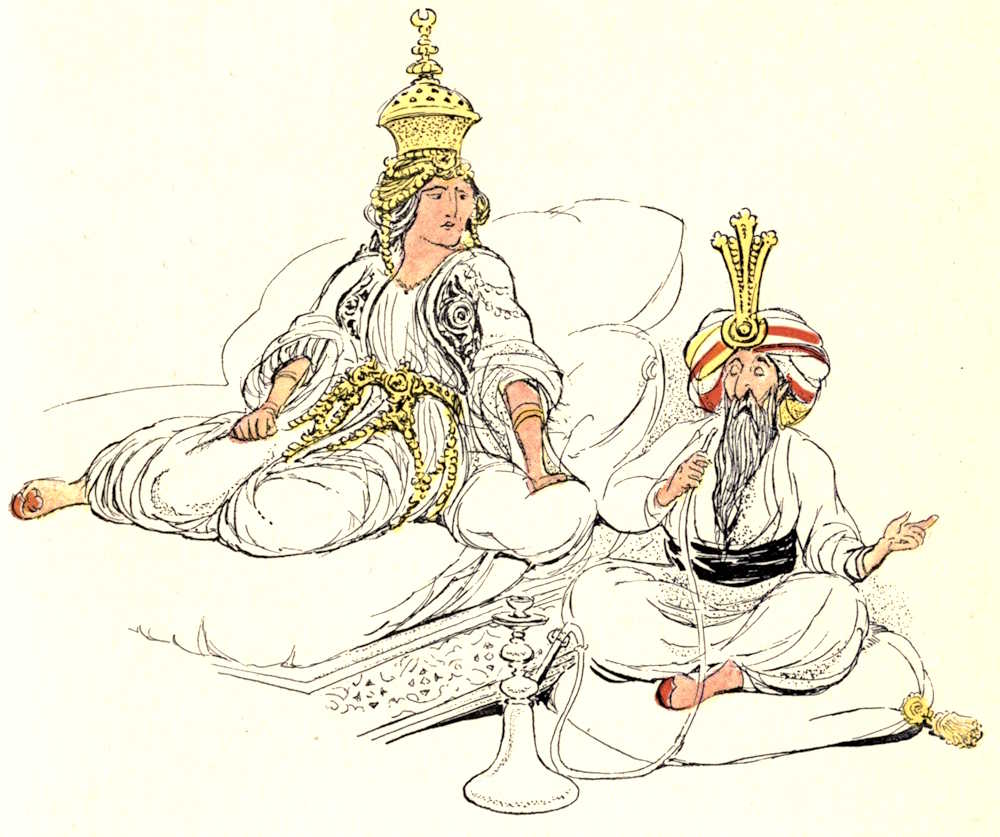
“‘In what way?’ asked his wife”
“Muley Mustapha,” said his wife, [Pg 15]sitting bolt upright, “you shall do nothing of the sort. ‘Sow his wild oats,’ indeed! He shall never leave my sight, not for a single moment, until he is a grown man and I have provided him with a wife to take my place as guardian of his morals. It ill becomes the trusted vassal of my noble father, the Sultan of Kopaul, to talk thus of corrupting the child who is to be one day ruler of that mighty empire. You forget that fact, Muley Mustapha.”
“On the contrary,” retorted the Pasha, a little tartly, “I am not likely to forget it, so long as the daughter of the Sultan of Kopaul condescends to remain the wife of the Pasha of Ubikwi.”
For Muley Mustapha had married above his station, and the circumstance had not been permitted to escape his memory. He never complained of his lot; but, when his faithful Vizier once[Pg 16] hinted that the Koran allowed each true believer the blessing of four wives, he answered with a sigh, “I find one enough for this world: the rest I will take in houris.”
Some subtle reflection of that sentiment must have made itself visible on the face of the Pasha at this moment; for his worthy spouse, with apparent irrelevance, suddenly exclaimed,—
“Muley Mustapha, if you are going to cast your vagabond Vizier in my face, I will leave the room—until I have time to go home to my father, who will protect me from insult.”
“Great Allah!” cried the Pasha. “Who is casting anybody in your face? And who has mentioned the name of the Vizier?”
But the virtuous Kayenna had risen to her feet, and in low, intense tones began:—
“Sir, there is a limit to what even a wife may endure. When I think that[Pg 17] a son of mine is threatened with contamination at the hands of a low, disreputable, adventurous vagabond, like your worthless underling”—
Here the good lady was so overcome by her feelings that she burst into a flood of tears, and had to be borne, shrieking, to her apartments.
“I foresee that I shall have trouble in bringing up that boy,” mused Muley Mustapha, as he relighted his nargileh, and stroked his flowing beard.
Braver man there was not in all Islam than the dauntless young Pasha of Ubikwi, whose valor on many a hard-fought field finally won him the favor of the Sultan of Kopaul, and the fair hand of that Sultan’s only child. Once, some years after his marriage, he propounded to Shacabac the Wayfarer, then a sage whose merits had not been appreciated by a dull generation, the old paradox of the Frankish schoolmen: “When an irresistible force meets with[Pg 18] an immovable object, what happeneth?” And the wise man answered, “In case of matrimony, the Force retireth from business.” Struck by the aptness of the reply, Muley Mustapha made the sage his Vizier on the spot.
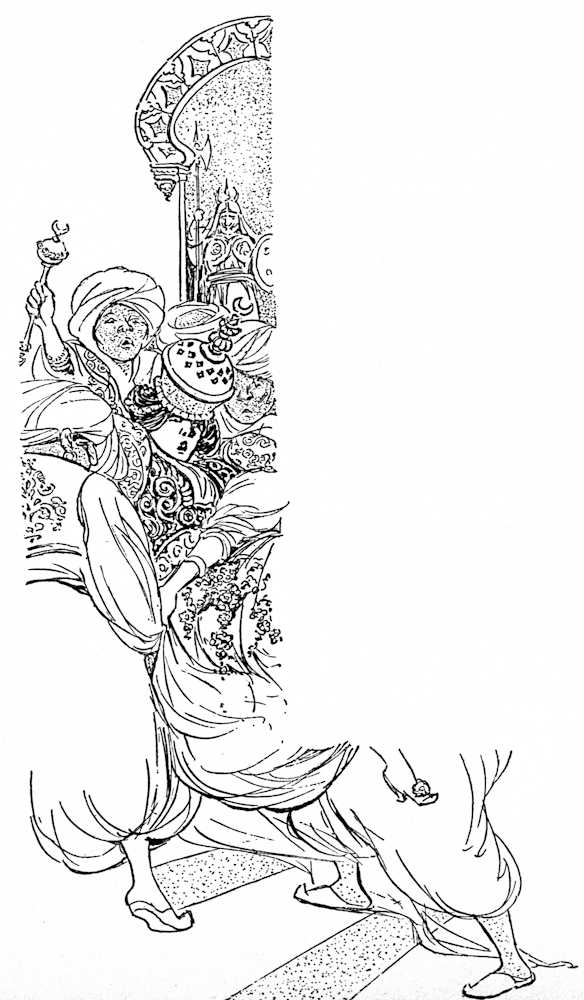
From that day forth the Pasha had peace in his household. There is much virtue in self-abnegation; but, like most unconditional surrenders, it does not always evoke the admiration of the victors. Yet was Muley Mustapha not without his[Pg 19] reward. Kayenna knew just how far she might venture in dictating to him, and, by judiciously yielding that for which she cared naught, managed ever to obtain that which she desired. Thus doth the wise spouse gain new raiment by denying to her lord the society of an unbeloved mother-in-law.
[Pg 20]
Three days after the occurrence of the events narrated in the preceding chapter a venerable man, clad in the robes of a physician, was ushered into the presence of the Pasha. He salaamed low, and said,—
“Great and mighty Pasha, I bring thee good news.”
“Speak,” said the Pasha: “what is thy news?”
“Great and good tidings,” answered the leech. “Mother and child are doing well.”
“Allah be blessed!” said Muley Mustapha. “And the boy? My own[Pg 21] little Muley! Is he a healthy, comely lad,—such an one, think you, as will hold his own among the gallants of the land, and not prove a puny milksop, clutching his mother’s apronstring?”
“Truly, O potent Pasha,” was the answer, “it is a fair and well-formed child, but”—
“But me no buts, knave,” roared the Pasha. “Darest thou say the boy is deformed,—blind,—deaf,—lame? Speak, or by the beard of the Prophet”—
“Mercy, O gracious lord! I meant nothing,” cried the sage, falling on his knees, “only this—the child”—
“Well, go on, and quickly. The child”—
“Is a girl, O great and mighty”—
But Muley Mustapha had leaped to his feet, spurning the old man from his way, and was shouting to his chief eunuch:—
[Pg 22]
“Ho, there, slave! Send me straightway the Vizier and the Soothsayer and—hark ye, slave, send me the Headsman. By Allah! there is work here for all three.”
The Pasha had a rich command of language, and he made free use of it while awaiting the summoned functionaries. Soon they were ushered into his presence, the swart Nubian, Al Choppah, bringing up the rear of the procession. The Soothsayer prostrated himself at the feet of the Pasha, who thus addressed him:—
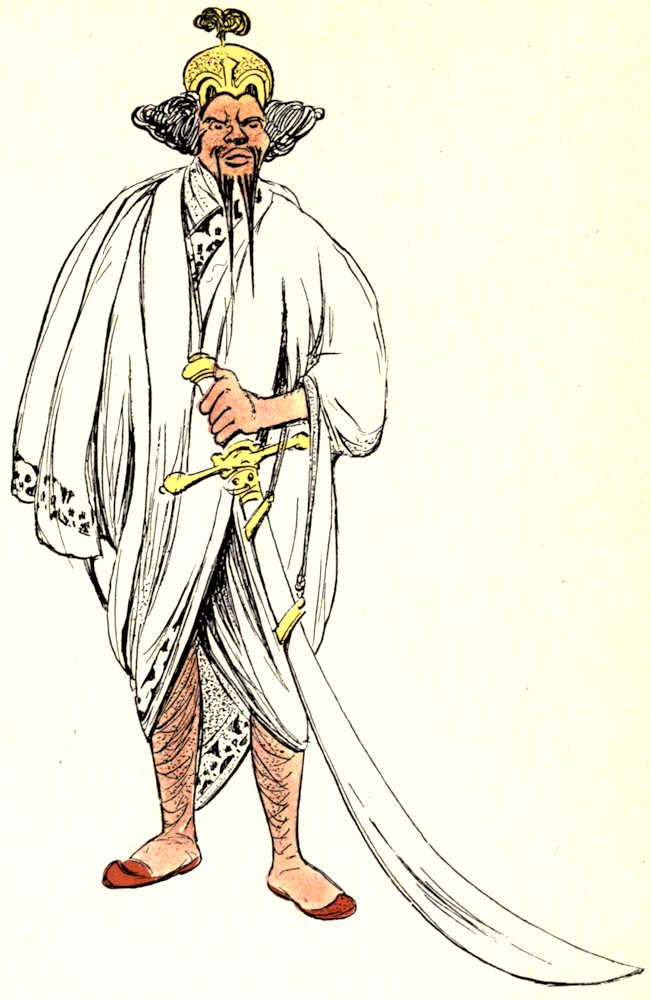
Al Choppah, the Headsman
“O triple-tongued liar and silverhaired son of Gehenna, what hast thou to say for thyself? Dost remember that but six months ago thou didst issue a prophecy, standing before us as proud and confident as Bhilibidam, the haughty prince of Eblis, and didst say that I was to be the father of a son, and didst warrant the prediction with thy head? What should be done, O [Pg 23]Shacabac, with such a defaulter on his sacred pledge?”
“So please your Highness,” replied the Vizier, promptly, “I should foreclose on the security.”
“It is well said,” quoth the Pasha, and, signing to the Nubian, bade him advance and do his duty.
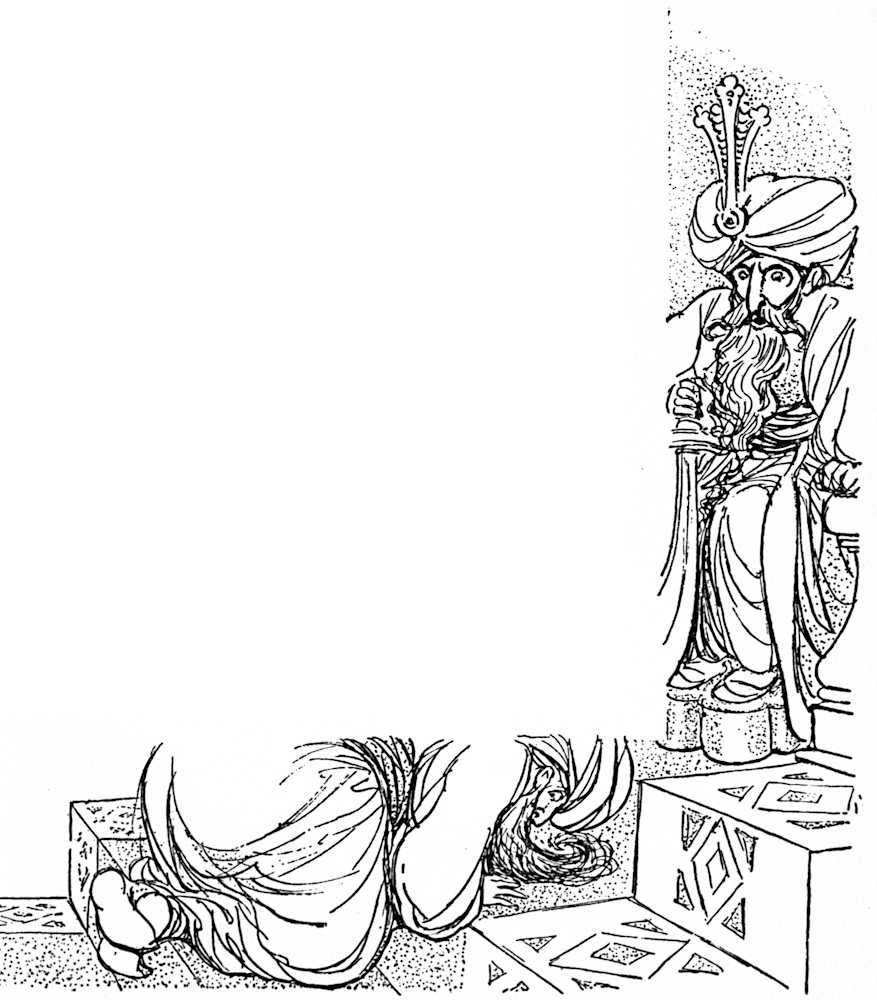
Al Choppah ran his thumb along the edge of his scimitar, swung it slowly aloft, and was about to bring it down, when the Soothsayer, in a trembling voice, cried out: “The will of Allah be done! But hath not thine own trusted adviser counselled mercy to all creatures, even to the least merciful? And, even though I die, I tell thee that the child born to thee this day shall reign over Kopaul!”
Astounded and secretly a little impressed by this remarkable speech, Muley Mustapha signed to the Nubian to withdraw to the ante-chamber. Then, bidding the Soothsayer stand[Pg 24] up, he said sternly: “Do not dare hope to escape thy doom by laughing at our beard. Explain thy riddle; but, first, Shacabac, what means the slave by saying that thou hast counselled mercy even to the least merciful of creatures?”
Shacabac, who did not disdain the music of his own voice, replied:—
“Truly, this Soothsayer hath deeply offended; but he showeth a proper taste in literature, and, perchance, seeth more of the future than ordinary mortals. It is true, I have counselled mercy to all creatures; for mercy may sometimes be wisdom. I have said:—
“‘Kick not the sleeping tiger in thy path; and, if thou meetest a shark in the river, go thy way,—the sea is wide enough for him and for thee.
“‘Utter no evil, not even of the dumb beasts. If thy horse offend thee, put him away from thee; and when[Pg 25] thou sellest him, speak only of his good parts.’
“I have also written: ‘Dispute not with thy neighbor if his hens permeate thy garden, but bid them welcome and give them shelter. So shalt thou have fresh-laid eggs for thy breakfast.’
“As to this wretched Soothsayer, I fear me much his character as a prophet is sorely damaged. Nevertheless, as I have written elsewhere:—
“‘A bad character is better than none at all. Rather behave ill than have men say of thee, “Lo, he knoweth not how to behave.”’”
Just then appeared a slave with the startling tidings that a messenger from the great Sultan of Kopaul had arrived and besought an interview.
If Shacabac was annoyed at being interrupted in the pleasant pastime of quoting from his own works, which is said to be not a displeasing diversion with other great writers, the Pasha[Pg 26] quickly recalled him to more pressing matters, by saying: “Now, Shacabac, great is thy written wisdom. Mayhap thou hast wit enough to tell us how we may break the news to the great Sultan, my father-in-law, that his ‘grandson’—dog of a Star-gazer, that was thy precious work!—is a granddaughter.”
But even the wisdom of Shacabac was unequal to such a contingency; and this true story would never have been written, had not the Soothsayer averted an irreparable loss to literature by humbly asking permission to speak.
“Speak,” replied the Pasha, “and see that thy words be precious; for on them hangs thy life.”
Thus encouraged, the Soothsayer first asked, how many people knew of the child’s sex. He was informed that, besides themselves there present, only the mother and the attendant physician as yet possessed that knowledge; but the whole country would[Pg 27] know of it, to their grief, when the wrathful Sultan learned how his hopes had been blighted. “And upon my head, O wretched juggler,” cried the Pasha, “shall fall the chief weight of his anger. Accursed be the hour in which I was not born a girl!” The last two words he uttered with infinite grief and scorn.
“Then, O Pasha, the country is safe, if the Physician be silenced, and we, keeping the secret to ourselves, inform the Sultan that his daughter and grandson are doing well. The Sultan is very old (may his years be many!), and he will have gone to his fathers long ere he discover the deception; and thou and thy noble spouse shall reign in Kopaul ere anybody know, if they ever know, that thy son is not thy son.”
Audacious as was this proposition, yet the Pasha grasped at it as a drowning man at a straw, especially as it met the approval of Shacabac. He generally[Pg 28] accepted the advice of that wise and good philosopher.
The Soothsayer and the Physician were enjoined to strict silence; and, the better to insure it, they were commended to the care of Al Choppah, the Nubian, who, being a mute, could tell no tales. His two guests do not appear again in this history.
[Pg 29]
But it was absolutely necessary for the peace and dignity of the realm of Ubikwi that the court should not be without an official Soothsayer. Wherefore the vacant office was presently filled by a young and promising astrologer, Badeg by name, who had studied for some years at the feet of his lamented predecessor.
Muley Mustapha, while secretly contemning the whole science because of the wretched blunder whereby he thought himself the chief sufferer (though the lately deceased soothsayer, had he been able to give an opinion, might have thought otherwise), found[Pg 30] it hard work to keep up a pretence of respecting the new incumbent and his office. Kayenna, more alive to the danger of arousing suspicion, took pains on every occasion to show profound respect for the holy man, and never failed to enjoin a similar course on the part of her lord. It was not her fault if Muley Mustapha erred on that or, indeed, on any line of policy; for in all Ubikwi there was not a wife more ready at all times to direct her husband in the path of right.
Nevertheless, there was something about the new astrologer which caused her uneasiness, worried Muley Mustapha, and disturbed the serene imperturbability of Shacabac. It was this. Whenever he issued a prediction, were it only a casual prophecy of the coming weather, he always accompanied it with a qualifying phrase, such as, “Allah permitting,” “subject to other conditions,” “errors and omissions[Pg 31] excepted,” or something equally foreign to all the traditions and precedents of prophecy. At such times he was wont to cast at Muley Mustapha, Kayenna, or the good Shacabac a swift, furtive glance which did not add to the mental composure of any of them.
Yet, such is the effect of a guilty conscience, not one of the three ever questioned his slightest assurance, no matter how the prediction turned out. If he foretold “rains, followed by showers, for the Lower Lake region,” on a given day, and that day happened to be the sunniest of the whole year, the Pasha was sure to appear in waterproof garments, with an umbrella ostentatiously in his hand, and took pains, if he met the prophet, to declare that this was truly a wonderful season for rain, but no doubt it would be good for the crops. The Soothsayer never made any reply other than, “Great is Allah, and wonderful are his ways!”
[Pg 32]
Kayenna was annoyed and Shacabac alarmed at the unwisdom on the part of Muley Mustapha in thus overdoing his part, especially as Badeg, grown bolder with the immunity shown him, began to be absolutely reckless in his prognostications, sending out forecasts of the stock market which, had they been followed, would have bankrupted the royal exchequer.
A deputation of traders called upon the Pasha to protest; but the wise Vizier met them with the calm assurance that the prophet was a man marked by heaven as insane, and therefore doubly deserving of homage. “Should his visitation prove chronic,” said the sage, “it may be taken as a sign that he should be made custodian of the national treasury.” Whereupon the merchants withdrew their protests, averring with one voice that without doubt the Soothsayer was sane and wise beyond the sons of men, and that they[Pg 33] would thenceforth accept his predictions as inspired, and govern themselves accordingly. The which they did; but it was noticed that the market from that time became conservative, and business flourished the more as it was fostered the less by government, even as the Giaour jest hath it, that the patient getteth well or dieth without the assistance of the doctors.
[Pg 34]
While the events recorded in the preceding chapter and covering some years had their influence on the affairs of state, life within the harem went quietly on. Kayenna, the faithful spouse of Muley Mustapha, accepted the congratulations of her friends on the birth of little Muley; and it was remarked that, so devoted a mother was she, nobody but herself was ever allowed to nurse or watch or otherwise care for the beloved child.
“My daughter will spoil the brat and bring him up a regular milksop,”[Pg 35] growled the great Sultan one day after paying a prolonged visit to the happy couple. “I thought you had an idea, Muley, of rearing the boy to be a manly fellow and letting him see the world.”
“Truly, I had,” was the reply, rather sadly made; “but, as he is our only child, his mother is so passionately attached to him that I cannot find it in my heart to train him as robustly as I should wish.”
“Bosh!” ejaculated the fiery old monarch. “My grandson should be taught to fear nothing, whereas he looks and acts like a girl. Send him to Kopaul for a while, and I promise you he will learn some manliness.”
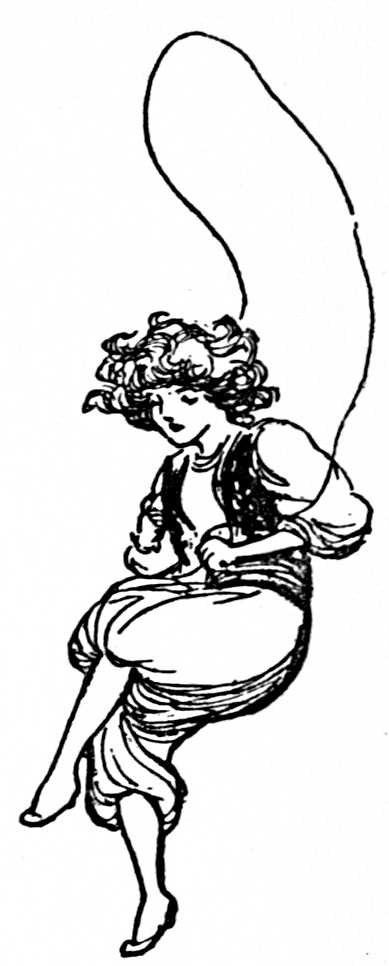
But to this proposition Kayenna demurred so vigorously that the old Sultan was forced to desist; for that truly admirable woman had the happy faculty, whether as daughter, wife, or mother, of bending every will in her own direction, which was that of[Pg 36] righteousness always. Heaven had blessed her from infancy with a fine flow of language, accompanied by a noble firmness of purpose, so that such was the repute of her wisdom, whenever she opened the coral portals of her speech, the whole court was ready to accept her dictum on any question rather than waste time and invite humiliation by the fruitless attempt to controvert her.
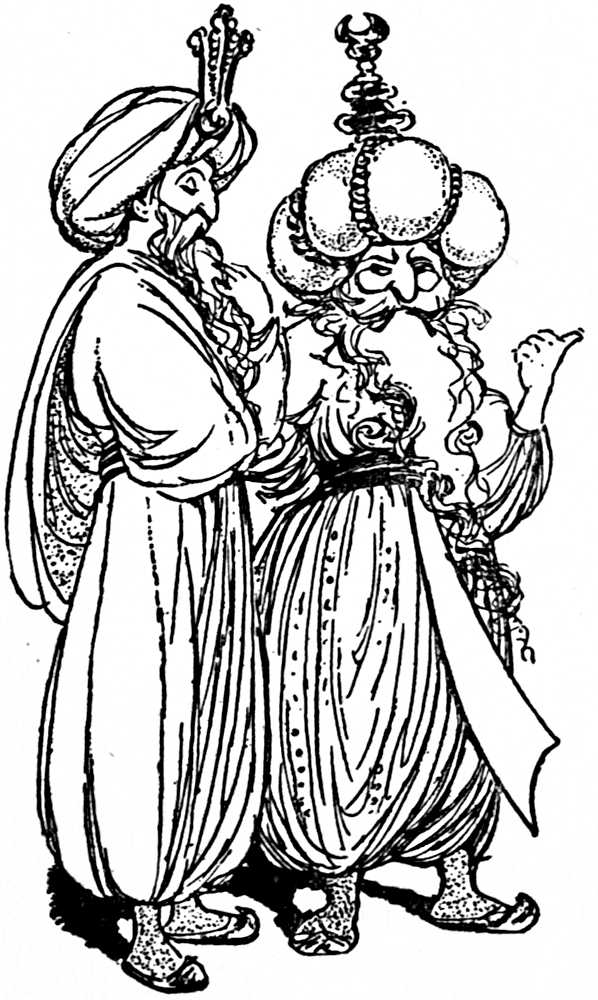
The Sultan went home discontented. Before departing, he took Muley Mustapha aside, and said impressively: “Muley, if I had a wife like yours, I would teach her humility if I used up a cord of bamboos and half a dozen[Pg 37] eunuchs.” Then, sighing heavily, he added: “After all, it is not your fault, but that of myself, who brought her up sparingly as to the bamboo. If you should ever have a daughter, Muley,”—the Pasha gave a slight start at the word,—“which Allah forbid!” continued the Sultan, “take the advice of an old man, and”—He finished the sentence with an eloquent gesture of the right arm extended from the shoulder at an upward angle of forty-five degrees, fingers close together, and palm forward. This gesture, when made with the arm raised perpendicularly, is a sign of peace among the Bedouins and other nomads. It was not as such that the Sultan employed it.
“What did my father mean by lifting his hand like the sail of a windmill? And of what was he speaking as he bade you farewell?” asked Kayenna, when she and Muley found themselves alone. “Oh, nothing,” was the reply.[Pg 38] “He was talking about the education of our daught”—
“Muley Mustapha! Do you mean to say that you told him?”
“No, no, my dear, of course not. Only when he said something about our ever having a daughter, I was so surprised that I feared he might have suspected something, and for the moment regretted that we had deceived him about his ‘grandson.’”
“And, pray, who deceived him?” queried Kayenna, with icy severity. “I, for one, have not. I have never told him that our little darling was or was not a boy. If he choose to deceive himself or to be deceived by tricksters like your vagabond Vizier, that is his own concern, not mine. I know what his gesture signified; but, thank Allah, corporal punishment was abolished in my nursery by my angel mother, and my honored sire has not forgotten the occasion, I ween.”
[Pg 39]
Kayenna wore such a pensive smile of retrospective happiness in saying this that Muley Mustapha did not give a moment’s entertainment to his father-in-law’s counsel, but prudently resolved to put the bamboo plant to other and more profitable uses; and Shacabac, to whom he confided his troubles, commented sagely: “The spinster knoweth how to bring up children, and the bachelor to rule a wife. It is well that they remain single: else who would be willing to leave this happy world, had they the direction of its family affairs?”
“How hath it happened,” asked the Pasha, after ruminating some minutes on this proposition, “that thou thyself hast never married?”
“Solely in order that I might the better devote myself to the improvement and instruction of my fellowmen; for, if there be one man on earth who knoweth less than all others, it is he who is the husband of a wife, and[Pg 40] she will be first to tell him the same. While Allah preserveth her, his halo shall never be too small for his head.
“No man knoweth what true happiness is until he getteth married: then is the knowledge rather a sweet memory than a new boon.
“Twice blessed is he in whose tent dwell both his mother and his wife’s mother; for, even though he gain not Paradise, yet shall he fear not Gehenna.
“In choosing a wife, disdain not youth nor beauty; for these are things which time will cure.
“Love not a woman for her riches; but, loving first the riches, thou shalt learn in time to love her for their sake.
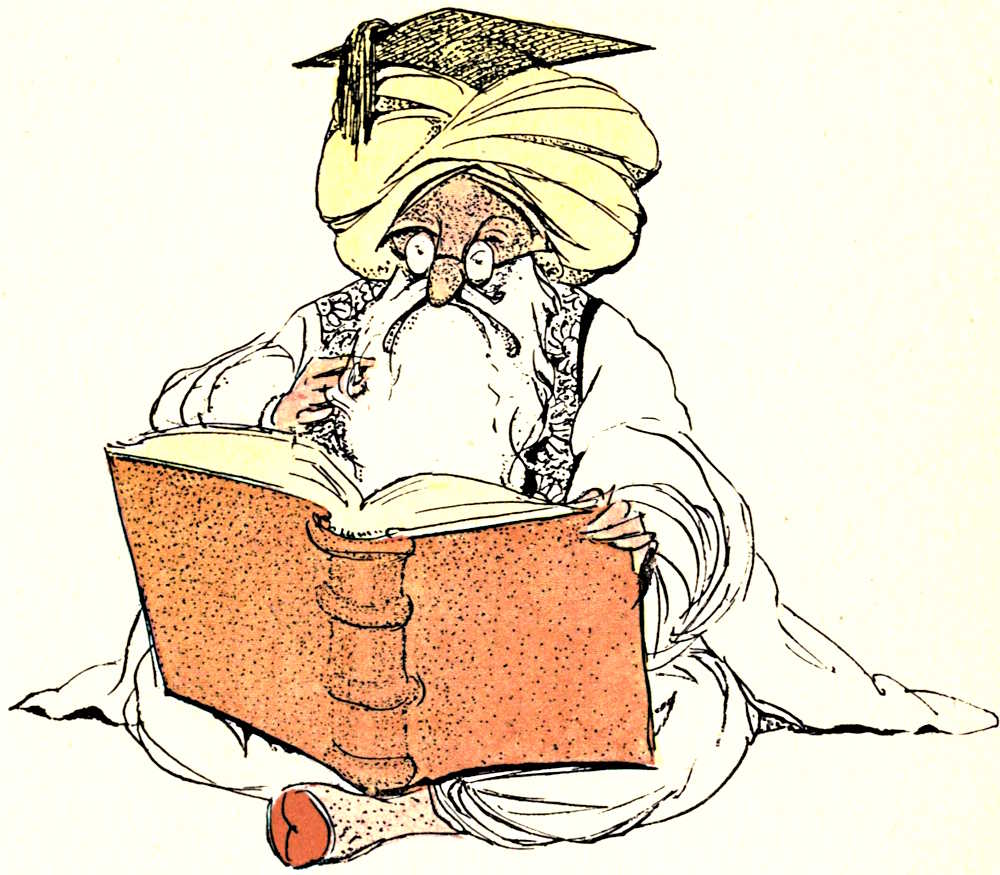
Shacabac, the Sage
“There are two ways of missing the miseries of matrimony: one is by not getting married, the other by not being born. The Prophet hath said that there is a third, which is by always overlooking the errors of thy partner. [Pg 41]I know naught about this, but it recalleth an apologue:—
“There were two brothers of Bassorah who dwelt under the same roof, both being married. They had the misfortune, about the same time, to offend their wives most grievously. Kadijah, the wife of the elder, was so incensed that she never again spoke to her lord. Zobeide, the younger, not only forgave her spouse, but made it a point every day, in reminding him of his fault, to forgive him again most solemnly. Yet was the husband of Zobeide no happier than that of Kadijah; and when, finally losing patience, she procured a divorce from him, the ungrateful wretch only said, ‘It is better to have loved and lost than never to have lost at all.’ Truly, matrimony is a state into which none but the wise should enter, and they do not.”
Encouraged by the silent approval of[Pg 42] the Pasha and fortified by a copious draught of the strong waters forbidden, but not unknown, to true believers,—concerning the use whereof he had eloquently written: “Hospitality saith, ‘Be blind when the guest helpeth himself to thy wine flask; but be deaf when he asketh for more’; also, ‘Tempt not thy neighbor with the cup which inebriates, lest he fall; but, if thy neighbor offer thee to drink, refuse him not, lest thou give him needless pain,’”—the Sage continued:—
“To be constant in love to one is good: to be constant to many is great.
“Politeness between husband and wife costeth nothing. Were it otherwise, the virtue would be even rarer than it now is.
“Marry not any woman out of gratitude, lest perchance she come in time to wonder where the reward cometh in.”
[Pg 43]
Furthermore, he inculcated the sage maxim: “Save up money for a rainy day, and it is sure to rain.”
He also added, perhaps irrelevantly,—for like other great philosophers he never allowed his mind to be fettered by text or theme,—“Be not concerned if thou findest thyself in possession of unexpected wealth. Allah will provide an unexpected use for it.”
In conclusion, he said impressively, after vainly shaking the now empty wine-flask: “It hath been said of the son of the desert, ‘Lo! he hath sand’; but what availeth a whole Sahara, and no sugar to blend therewith? Or who that hath a river before his door, and never a cow in his barn, shall grow rich in the milk business?”
To this pertinent question the venerable Muley Mustapha made no rejoinder, because in truth he had fallen asleep ere the Sage had been fairly launched on his discourse, which would[Pg 44] have been lost to posterity, had not the speaker thoughtfully taken notes of the same,—a practice commended to all preachers afflicted with drowsy congregations.
Shacabac withdrew silently from the presence, musing—not for the first time—on the generous lack of appreciation bestowed by the great upon the wise. As he was about to enter his humble domicile, he suddenly perceived a large tiger stretched sleeping before his hearth, whereupon he moved noiselessly to the roof of the house without disturbing the fierce animal or alarming the other inmates who might molest the unbidden visitor. Unhappily, his delicacy was but ill rewarded; for his rich and parsimonious uncle, whose fortune he subsequently inherited, on entering the kitchen the next morning, was incontinently devoured by the ungrateful brute. The sad event was commemorated by the Sage in a noble threnody,[Pg 45] wherein the virtue of resignation is beautifully set forth. Rare indeed was the occasion, or dire the catastrophe, from which the worthy man could not extract some moral or material benefit.
[Pg 46]
So it came to pass that little Muley grew up into his nineteenth year, a tall, well-favored, graceful stripling, but distinctly a “mother’s boy”; and nobody but his parents and the discreet Shacabac held, or thought they held, the secret of his effeminate appearance.
Then one day, sudden and fearful as the khamsin wind of the desert, came a message from the aged grandsire, informing Muley Mustapha and Kayenna that he had contracted a noble alliance for the heir to his throne with the Princess Amine, only daughter of his neighbor, the powerful King of Nhulpar.
[Pg 47]
Now here was a most serious complication. The King of Nhulpar was the mightiest monarch of all the earth. Twenty caliphates trembled at his nod; an hundred thousand lances were levelled at his word; the number of wild riders ready to follow his standard were as the sands of the desert multiplied by the sands of the seashore. When he said, “Do this,” it must be done, whether it could be done or not. In fact, he rather liked performing impossibilities by proxy, the daring one who failed in the task being added to his Majesty’s large and varied collection in the royal mausoleum of Dedhed.
Had he known that the Sultan of Kopaul in offering his “grandson’s” hand in marriage to the Princess Amine was essaying the most impossible of all impossibilities, he would have been delighted beyond expression. He had not a single Sultan’s head in his album; but even that of a Pasha was not to be[Pg 48] despised, as Muley Mustapha thought with a shudder, when he was apprised of his father-in-law’s well-meant but most compromising negotiations.
What was to be done? It was not possible much longer to deceive the old Sultan; and it was absolutely out of the question to traverse the wishes of the fiery king.
“You see to what a pass you and your vagabond Vizier have brought us,” said Kayenna. “Now, mayhap, you may be able between you to extricate us from it.”
“I—I don’t know,” stuttered the bewildered Pasha, who did not see why he was especially to blame for the blunder of a dead and gone Soothsayer. Then, clutching at the suggestion of a companion in misery, he added: “By all means, my dear, let us call in Shacabac; and he may advise us for the best. He has some very sound views upon matrimony, I know.”
[Pg 49]
“Yes, no doubt he has,” said Kayenna, ironically. “I can fancy what they are like, but I should wish to have him repeat them to me.” Kayenna did not admire the abstruse philosophy of Shacabac, which she did not fully understand; but, with keen feminine intuition, she knew that it could be only evil, for she disliked the philosopher. She was, however, seriously impressed with one of his more homely maxims, which she always endeavored to follow, namely:—
“Talk not with thy guest of his own affairs, for with those he is sufficiently acquainted; but discourse ever of thine own,—of thy good luck and ill, of thy horses, thy servants, thy children, and thine ailments. If thou dost not succeed thereby in making him feel at home, thou mayst at least induce him to wish himself there.”
Fortified by these maxims, Kayenna[Pg 50] consented to the presence of the Sage at the family council.
The messenger despatched for Shacabac found him in his lecture hall, discoursing to a class of scholars on Omens, and illustrating his words of wisdom with apposite examples. Even royalty had to wait until the precious pearls falling from his lips should be gathered by his hearers. He was saying:—
“It is very lucky to find a horseshoe, if there be a horse attached; but unlucky, if the owner be about.
“It is a bad omen to meet, on leaving thy house in the morning, a mad dog, a tiger which hath not breakfasted, or a man to whom thou owest money.
“Steel cuts love. The great Sultan Ras-el-Dasl never knew perfect conjugal bliss after inadvertently throwing the carving knife at his favorite sultana.
[Pg 51]
“To break a mirror is also portentous of evil. Backsheesh, the porter, once incautiously smashed a large pierglass over the head of his spouse; and it cost him a month’s fees to replace them both.
“It is unlucky to sleep thirteen in a bed.”
Here the Sage was rudely interrupted by a voice, which said, “I know of something yet more unlucky than all of these,—something which neither great nor small, neither Pasha nor Sage, may do with impunity.”
Shacabac fixed an angry eye in the direction of the intruder, but lowered it when he discovered the speaker to be Badeg, who was gazing at him with a contemptuous leer.
“I see a messenger from the palace,” said the Sage; “and this class is now dismissed. Badeg, I will speak with thee anon; for I would fain know what thou hast learned from the stars that is[Pg 52] more wondrous than the marvels of which I have humbly discoursed.”
“Speak as thou wishest, or hold thy tongue, if that be wiser,” replied the Astrologer, insolently; “but my words are for thy betters, who may find them more precious than golden sequins, and only less valuable than my silence.”
With this significant threat, Badeg wrapped his mantle about him, and strode away, leaving a visible impression on the minds of the students, who listened to him in wonder.
Shacabac, much disconcerted, repaired to the palace, where he remained long in consultation with the Pasha and his spouse.
But, in a case wholly without precedent in history or fiction, the wisdom of even so great a man as Shacabac is necessarily at fault: the experience of one so aged as Muley Mustapha avails no more than the instincts of a child. Only the intuition of the superior mind[Pg 53] finds a solution of the difficulty, or, at worst, a means of deferring the catastrophe.
The present case proved to be no exception. After listening patiently to the timid suggestions of her lord and the ineffectual though sagacious aphorisms of the Vizier, Kayenna calmly observed: “I see that there is but one way of settling the matter. I will go with the child to Nhulpar.”
“And tell the King the truth?” cried both men, in consternation.
“And tell the King the truth,” echoed Kayenna, blandly.
“But it will cost both of your lives!” exclaimed Shacabac.
“It will cost me my Pachalik,” cried Muley Mustapha, dismally.
“It will cost fifty thousand gold sequins, to begin with,” replied the noble matron. “As a preliminary step, you will order the First Lord of the Treasury to go into the Street of the Moneychangers,[Pg 54] taking the Court Torturer along with him, and solicit a loan of that sum, at par, within half an hour. I shall prepare for our departure on the day after to-morrow, at sunrise. You, Shacabac, will come with us. See that the caravan and guards be ready ere the break of day.”
[Pg 55]
Great were the rejoicings in Ubikwi when the news was announced that the young Prince Muley was about to wed the daughter of the mighty King of Nhulpar, becoming thereby prospective heir not only to the Pachalik of Ubikwi, but also to a great Sultanship and a vastly greater Kingdom. The people rejoiced with great joy, not reflecting that, perchance, the cost of sustaining the triple dignities might fall heavy on their own shoulders. But it hath ever been the way of the populace to take delight in increased burdens, provided the packages only be gaudily decorated;[Pg 56] wherein they differ from the camel and the ass and other brute beasts, which have no appreciation of æsthetics.
The merchants, especially, who everywhere boast of being a conservative class, that would rather pay ten piastres of tribute than one for the suppression of brigandage, hastened to lay their loyal congratulations before the Pasha. Shacabac received them affably, and in reply to their address delivered a discourse fraught with practical wisdom, of which unhappily only a few fragments have been preserved to this day; but these are not without their value to traders of another and a foreign generation. He said:—
“We have all more or less to do with Commerce. We buy goods, and sometimes pay for them. We sell the precious products of our hands or brains at the best price we can get. If the buyer pays up, we are sorry that we[Pg 57] did not charge him more. If he fails, we are glad that he did not decide to pay less on the piastre. When we have grown very rich, we speculate; and that keeps us from being purse-proud and haughty.
“Be diligent in keeping your accounts. It is better to charge an item twice than to forget to charge it once. That is the true principle of Double Entry.
“Pay as you go, but not if you intend going for good.
“Boast not of your wealth; but let humility curb your tongues when the Assessor cometh around.
“Buy when the market is rising: sell when it is going to fall. If you be not a prophet, any friend on the Street will notify you of each impending change. Were it not for this unfailing, beautiful trust in human nature, few of us would be able to make money.
[Pg 58]
“In selling goods by sample, let the samples be at least as good as the bulk of the merchandise.
“Do not put all the best figs at the top of the crate. Have just as good a layer on the bottom also; for there are sometimes evil-minded persons who open the package at that end.
“Concerning truth: Do not believe all that you hear or see,—not even in the newspapers. Advertisers are human and liable to err.
“It is a great mistake to suppose that all men are rogues. If there were not a large majority of fools in the world, who would buy stocks?
“The essence of Free Trade is embodied in the axiom: Buy in the cheapest and sell in the dearest market. This is absolutely correct. I myself have bought shares for ‘half nothing,’ and doubled my money inside of a week.
“Time is money. Every second[Pg 59] saved at your mid-day lunch means so many sequins by and by for your family physician.
“Be not angry with your creditors, if they importune you. It is nobler to forgive and forget them.
“‘Three removes are as bad as a fire,’ but that depends largely on how you stand with the underwriters.
“Do not judge a customer by the clothes he wears: he may not have paid for them. Be courteous to all men. The humblest of your neighbors may sit upon your jury one day.
“A business man who finds it necessary to attend a daily noon prayer-meeting is either abnormally virtuous or his piety is of a kind that needs a good deal of stimulus to keep it going.”
A young man who had listened with attention to this discourse came at the close to Shacabac and asked, “How shall I become rich without too much trouble?”
[Pg 60]
“List to me,” replied the wise man, “and I will teach thee in six easy consecutive lessons, at one sequin per lesson.”
The young man, joyfully complying, paid the money, and sat at the feet of the Sage. But, when the course was over, he cried out, “Bismillah! thou hast taught me naught.”
“Nay,” returned the Sage. “I have taught thee how to make six sequins. Go to, ungrateful one.”
And the ungrateful one, abashed at the reproof, immediately opened a Commercial College where every branch of Business could be learned “while you wait.”
But the envious Badeg, looking on, scoffed aloud, saying, “I know how to make a fortune without waiting at all!”
[Pg 61]
A splendid retinue attended the virtuous Kayenna, the highborn Prince Muley, and the Sage Shacabac, as they set out at sunrise of the next day, from the gates of Ubikwi, on the long and toilsome journey to Nhulpar. Muley Mustapha watched them with tearful eyes, not knowing when, if ever, they might return, nor what might be the event of their enterprise; still less—and this concerned him most sorely—what would become of him in their absence. Nor were his forebodings lightened when he beheld the astrologer Badeg grinning[Pg 62] malevolently at the departing caravan. He would have been even more disturbed in mind, had he seen the latter, as the cavalcade was setting forth, pluck the sleeve of Shacabac, and heard him whisper the fateful words: “You asked me what omen was more malign than any of those you named. I will tell you. It is to cheat a mighty Sultan and try to cheat a mightier King by palming off a Princess for a Prince!”
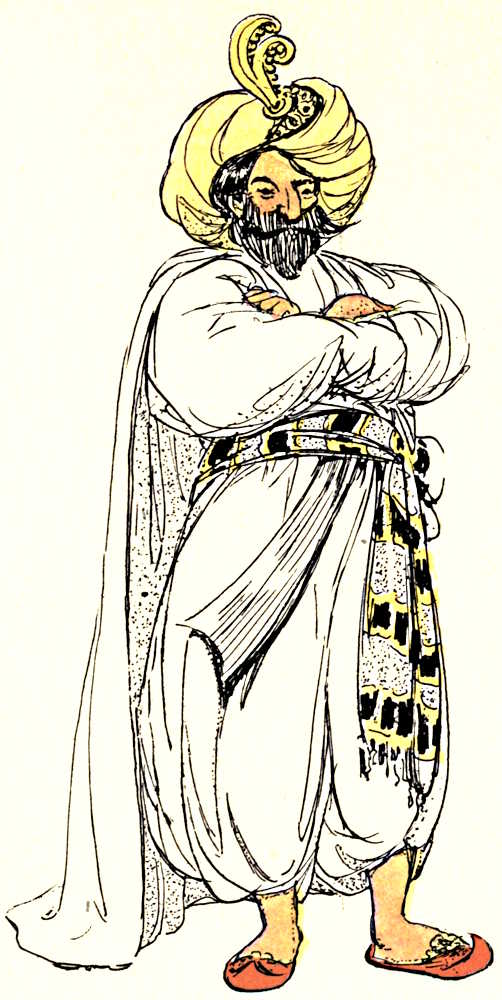
Ben Zoin
Pale with mingled anger and astonishment, Shacabac rode his camel beside that of Kayenna, and, begging a private interview, hastily confided to her the malignant words of the astrologer. The brow of the fair lady darkened as much as a brow so fair could lose its alabaster hue. Then, summoning her chief of staff, she said to him, “Hark ye, Ben Zoin, trusty servant of my royal father, take at once twenty of your best lances, and, when we shall have reached the well of Al-kohol, and [Pg 63]the caravan is in bivouac, steal forth with them, letting no man know it but yourselves, and ride as for your lives to the capital of Kopaul. Demand immediate audience of the Sultan,—this signet ring will admit you at any hour,—tell him that there is treason in Ubikwi. Bid him summon his forces, and march at once to the relief of my husband. Should he find the rebels contumacious and able to withstand him, let him say to them that Kayenna of Ubikwi, with her son, the Heir Apparent of Nhulpar, and an hundred thousand spears, will be at the gates ere the waning of another moon. Go, and be silent; for traitors may be in this caravan also.”
The bearded, black-browed Ben Zoin bowed as he took the sacred signet, and promised to be at the capital of Kopaul as speedily as camel might carry him.
“Thou didst well to tell me of that caitiff’s words, good Shacabac,” said[Pg 64] Kayenna, graciously; “and, though thou art not over-clever in all things, yet I believe thee honest in most. For this act thou mayst find thyself one day Grand Vizier of three realms, an thou diest not of thy weight of wisdom in the mean time.”
Laughing gayly as the caravan presently came in sight of the oasis of Al-kohol, she gave the order to camp for the night. But ere the second hour of encampment had passed, Ben Zoin and a score of the best lances in the cavalcade had stolen noiselessly out of the enclosure; and none were missed until the morning’s muster.
“Where is my trusty Ben Zoin?” asked Kayenna, when the caravan was forming in order of march. Shacabac was so surprised at the question, knowing what he knew, that he was on the point of explaining to her, when a look from her keen eyes closed his lips.
[Pg 65]
“God is great,” he muttered to himself. “Of a verity, I am becoming an imbecile; or, mayhap, I have been one all my life without knowing it. If so, Allah be praised! there is yet some hope for me; for he who beginneth to understand himself hath at least reached the outer portals of Knowledge. But what an actress she is!”
Nobody seemed able to answer the question propounded so simply. The captains of the guard, all old soldiers and comrades of the missing warrior, said that they knew not how to explain his absence.
“He may have gone reconnoitring,” said one.
“Some mischance hath surely befallen him in the night,” said another.
“An evil genie may have spirited away him and his companions,” said a third, who was brave, but imaginative, and suspected of composing poetry in his hours off duty.
[Pg 66]
“Most likely he hath proven traitor, and deserted,” said the voice of another, who was not of the old guard.
“Ha! what sayest thou?” cried Kayenna. “Come hither. Thy words are ominous. Come to my tent at noonday, and we will inquire further. This disappearance must be explained.”
Nothing more was heard of the missing soldier and his fellows; and the caravan, much disturbed in mind, halted at noon by the oasis of Rhi, near to the wells of Bûrbon, famed for the exhilarating quality of their waters.
“And so thou hast reason to apprehend that Ben Zoin and his men have deserted the caravan of the Pasha’s wife, being traitors or cowards?” queried Kayenna of the man who had suggested that explanation at the morning muster.
“No,” stammered the man: “I have no reason, only that it stands to reason that they could not have gone away[Pg 67] save of their free will; and what else could they be but traitors if they”—
“Strange,” mused Kayenna, “that an honest man never suspects his neighbor of being a knave, while a rascal is ever distrustful. But suspicion is like a plague. Once started, it attacks all. I even have caught the infection, and cannot withhold my suspicions of this worthy fellow. Let him be searched forthwith, so that my unjust thoughts of him may be forever dispelled.”
So, in despite of his protestations and even vigorous resistance, he was promptly stripped; and, lo! within the lining of his caftan was found a scroll of parchment addressed to his Majesty, the King of Nhulpar.
“I did not know,” said Kayenna, “that we had in our retinue a bearer of dispatches to the sovereign whom we are about to visit. From our worthy lord, mayhap?”
The poor wretch only shook his head.
[Pg 68]
“Not, perchance, from our royal father, of Kopaul?”
The captive groaned.
“Then, as it does not appear to be a privileged communication, I will take the liberty of inspecting its contents. Meanwhile, Shacabac, you will bear witness that I have the messenger’s permission to examine the document.”
As a matter of fact, she had not that permission; but the last man on earth to challenge the statement at that moment was the poor wretch pinioned by two stout guards and overshadowed by the giant form of Al Choppah, who, without understanding a word that was said, grinned anticipatively, as a conscientious sinecure might, at the thought of doing something, however trifling, in the line of duty.
“To his Most Puissant Majesty, the Mighty King of Nhulpar,” read Kayenna, as she unrolled the scroll, “from Badeg, Astrologer-in-chief to[Pg 69] the Court of Ubikwi, in prospective to the Court of Kopaul, and in humble hope to the Royal Court of Nhulpar, these:
“I take this opportunity to inform your most gracious Majesty that the caravan which sets forth this day for your royal court goes upon a wicked and deceitful errand; namely, to impose upon your Majesty.”
“That is enough,” said Kayenna, refolding the scroll. “I see that thy master has been good enough to cast the horoscope of the King of Nhulpar; and a very pretty one it is. Pray tell me, has he cast thine, also? No! Well, let me do it for thee. It is not a very bright one; but it hath this advantage over even more auspicious predictions, that it is absolutely and irrevocably true. I do not need to know under what planet or conjunction of the stars thou wast born, nor in what ‘house’ a single sign of the zodiac was[Pg 70] domiciled on that unlucky day. Thy fortune began with the moment when thou didst accept the commission of that villain Badeg to play the spy and traitor on this caravan, and it will end ere the sun set on another day. Hast ever heard of the two-headed Snake of Rhi, the horrible monster with a venomous mouth at either end of his body, wherewith he devours his prey? What? Badeg forgot to mention that trifling wonder to thee? What a dull knave he is to set himself up for an astrologer! In a little while thou shalt know more than he has learned in all his life; but the knowledge will not abide with thee so long, perchance. Ho there, Al Choppah, put up thy scimitar! There is rarer sport here. To-morrow there shall be a treat for the caravan and the two-headed Snake of Rhi.
“This two-headed serpent,” explained Kayenna, carelessly, to Shacabac, “is a rare monster which delighteth[Pg 71] in flinging himself bodily on his prey, striking it with the middle of his length, then tightening himself, fold on fold, around the victim, until, life being all but crushed out, he feasts with his double heads on the dying body. I care little for such spectacles myself, for I think they savor of the grotesque; but it will amuse our caravan, and make a weary hour pass pleasantly.”
[Pg 72]
Now it happened that, some days before, a guard came unto the tent of Shacabac, leading a tattered remnant of humanity, who had been found crawling toward the spring in dire distress. After allowing him to slake his thirst, and being unable to obtain from him any coherent explanation of his forlorn condition, the guard brought him before Shacabac.[Pg 73] The Sage, after bidding his body-servants to relieve the stranger of his valuables, asked him how he came to be in such woful plight. The outcast replied in the Lingua Franca dialect: “Truly, because I could not resist the inducement of a free ride from Nhulpar to Ubikwi; but the people of my caravan deserted me in the wilderness two days since, and I have been in sore straits to reach this oasis.”
“And what was thy business in Ubikwi?” asked the Sage.
“None whatever,” replied the stranger; “but it was a free ride,—have I not told thee so?—and of course I went along.”
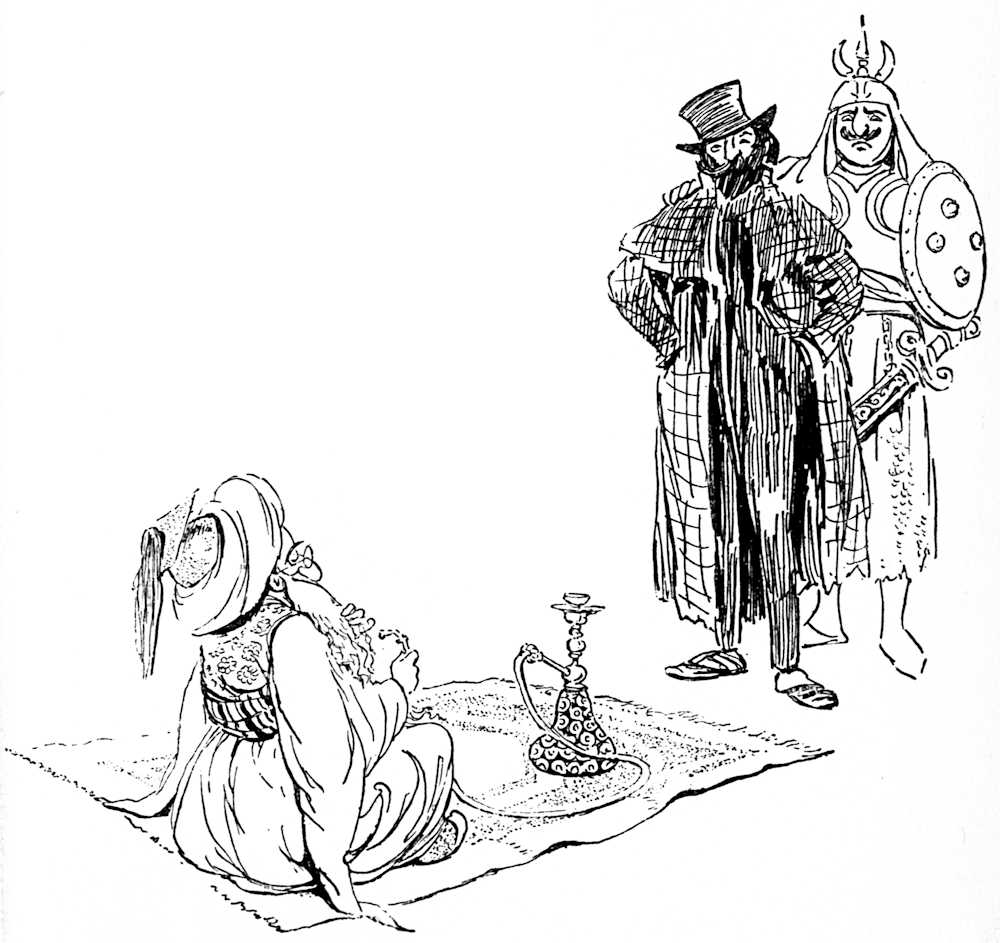
Struck by this[Pg 74] remarkable explanation, the Sage asked, “Of what country art thou?” and the enfeebled one, lifting his head proudly, replied, “I am an American.” “Nay,” responded Shacabac, “thou art more likely to prove erelong that thou dost belong to a yet more numerous race,—that of the deadheads.”
Nevertheless, he was so moved by the piteous condition of the stranger that he allowed him to join the caravan and lead a pack-camel every day during the rest of the march. And the Sage wrote upon his tablets this precious aphorism: “The free lunch is for the thirsty, not for the hungry.”
A happy thought now occurred to Shacabac, and he said:—
“The two-headed Snake is a beautiful instrument of justice; but, if your Highness will pardon her slave for offering a suggestion, I think that the penalty is a trifle too short-lived. The crime deserves a more prolonged punishment.”
[Pg 75]
“That is true,” rejoined Kayenna; “but, unfortunately, we omitted to bring the Court Torturer with us on this journey, and we can ill afford to waste precious time in mere diversion. Nevertheless, if you think of any device which may serve to enliven the noon hour of rest, do not hesitate to speak. I feel in a kindly mood toward all the world at present, and would not rob so true a friend as yourself of any innocent pleasure.”
Thus encouraged, Shacabac proposed that the stranger whom the caravan had picked up by the oasis of Rhi should be sent for, and interrogated concerning the criminal jurisprudence of his outlandish country beyond the Western Ocean.
Kayenna was pleased to look graciously upon the suggestion, and immediately despatched a slave in search of the stranger, who promptly appeared at the entrance of the pavilion of state.
[Pg 76]
Great was the surprise of Shacabac on beholding the transformation which had occurred in the appearance of the man, but a few days agone the most forlorn outcast in all the land. From the rich folds of his jewelled turban to the red tips of his Levantine slippers, the whilom vagrant was attired in splendid raiment, and bore himself with that dignity which in Occidental lands marks the owner of sumptuous apparel. Shacabac, whose keen eyes took note of all things, quickly recognized the habiliments before him.
“Amrou’s turban,” he said to himself, making a mental inventory, “Cassim’s slippers, and Selim’s caftan! That is the scimitar of Sokum, resting in the sash of Tippoo, the Congo porter, beside, as I live, the yataghan which I myself did foolishly wager but yester eve on the fall of an idle card! An this keep on, the rascal will own the whole caravan ere we reach Nhulpar.”
[Pg 77]
For, by some necromancy known to his barbarian countrymen, the stranger had learned to control the fortuitous movements of inanimate pieces of pasteboard, so that they fell ever as he listed, but always contrary to the wishes of the true believer, who vainly challenged fate on what seemed a certain result. Allah alone knoweth how such prodigies are permitted to come to pass.
Stifling his anger at this last outrage, because of Kayenna’s presence, he bade the stranger kneel at the feet of her Highness, and affably addressed him as follows:—
“Dog of an unbeliever and scum of the saliva of jackals, her most gracious Highness deigns to ask of thee in what way do thy obscene countrymen punish a knave guilty of high treason against the mockery which they miscall a government.”
Whereunto the outcast replied, “Which?”
[Pg 78]
“It is not a question of Which or of What,” said Shacabac, severely, “but of How. In what way do the misguided infidels of your country treat their desperate criminals? for I suppose that not all of them are permitted to escape justice, and flee to more blessed lands, wherein they are enabled to despoil the followers of the Prophet.”
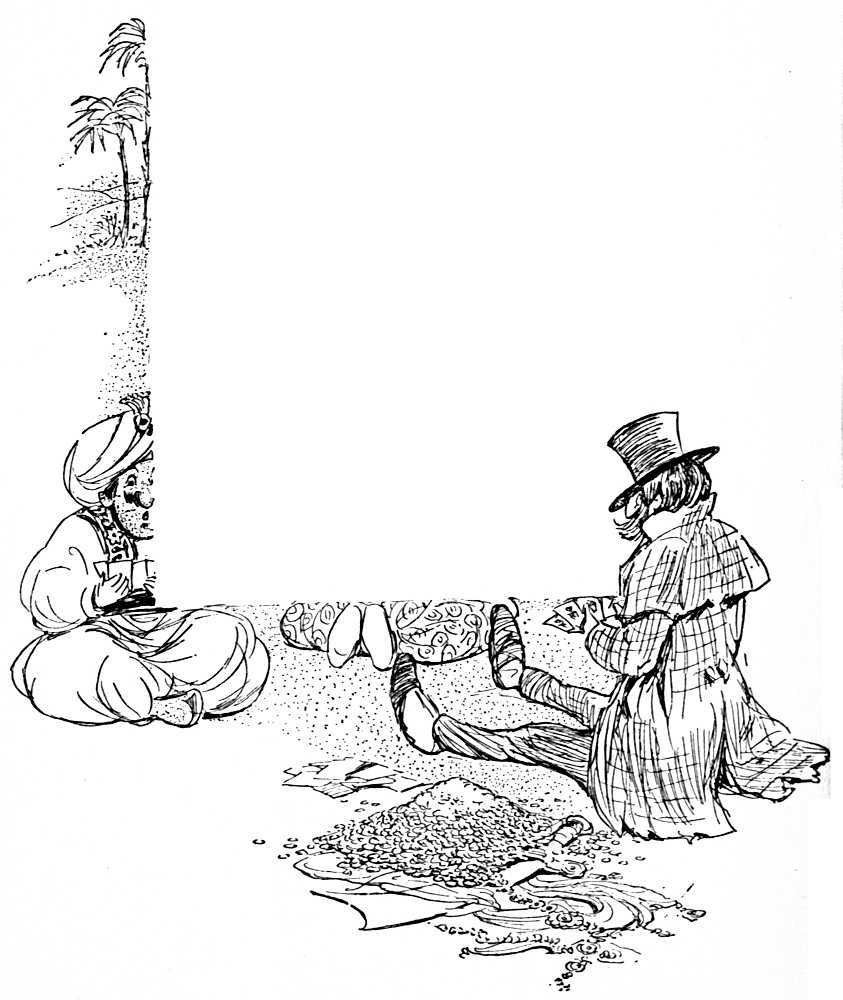
“In grave cases,” said the stranger, after a moment’s reflection, “when the accused has neither friends nor money nor influence, he is subjected to preliminary torture at the hands of what we call the Interviewers. Often he is present in person during the ordeal;[Pg 79] but that is largely optional with him, and wholly so with them. In practice it has been found that the most satisfactory interviews are conducted in the absence of the subject. It is a matter of taste and convenience. The real ordeal begins when the prisoner is subjected to the Process of Lor.”
“And what is that?” asked Kayenna and Shacabac, as with one breath.
“It is a complicated process,” was the answer, “but highly instructive. In the first place, the judge, or Cadi, as you would call him, orders twelve men, who know nothing about the case,—otherwise they would not be selected,—to be arrested and imprisoned until the guilt or innocence of the accused can be established. Absolute ignorance of the question is the prime essential governing the selection of the twelve; but total ignorance of everything constitutes the ideal qualification of what we call a ‘juror.’ The less the jurors[Pg 80] know or are capable of knowing, the greater the probability that they will speedily agree upon a verdict. It is a very wise and ancient provision of Lor,” added the stranger, reverently; “for, if it were something foolish and new-fangled, it would seem impossible that any twelve men of intelligence could agree unanimously upon a question so intricate as those which are usually brought before our juries. Happily, however, the jurors are not supposed to be intelligent; and, consequently, they nearly always agree upon a matter concerning which any two of them would scarcely be found in accord outside of the sacred jury-room.”
“But, when they have agreed,” interposed Kayenna, who had a mind for things concrete, “what happens to the criminal?”
“Oh, the criminal!” responded the stranger: “he is put under restraint at the beginning of the proceedings, as are[Pg 81] the witnesses also, if there be any; but that depends upon whether or not they be able to furnish securities for their appearance in court.”
“It is a strange system, this administration of Lor, as you call it,” said Kayenna, not without some suspicion that the stranger was indulging in romance; “but tell me in a word, does it never punish anybody?”
“Does it?” ejaculated the stranger. “Well, I should say it does. It punishes everybody,—the jurors, the judge, the witnesses, the people who have to hear or read the proceedings of the court, the citizens who have to pay for all the business. Why, even the prisoner himself is sometimes punished, and always more or less annoyed by the procrastination and uncertainty of the whole affair. There are times in the life of such a man when he almost feels that Lor itself is a failure. Of course, he has his consolation, such as[Pg 82] it is, in the flowers and sweetmeats and love-poems sent to him by non-resident members of Female Asylums for the Feeble-minded, once he is found guilty of a dazzling crime; but what are flowers or candy or poetry to a man who feels that he is losing time which might be homicidally valuable to himself and society, under different circumstances?”
The stranger spoke with some heat, as one who might have himself experienced the sad uncertainty of Lor; but Kayenna, with her logical mind, brought him quickly back to the main point.
“You say,” said she, “that the criminal is sometimes punished. Describe the process of capital execution.”
“It varies,” responded the stranger, “in the different sections of my country. In some places the condemned is strangled: in others he is imprisoned ‘for life,’ but usually pardoned after a[Pg 83] few years. In the State where I last dwelt they have introduced the fashion of electrocution; that is to say, of killing the victim by electricity.”
“And how is that done?” queried Kayenna, always interested in anything savoring of novelty.
“I fear I cannot explain it clearly without the aid of a Brush generator or a dynamo of some kind, and I do not see anything of the sort hereabout. But your Highness no doubt has often seen the effects of a thunder-storm whereby somebody was slain, in the twinkling of an eye as it were. It is thus that we destroy such of our criminals as outlive the Process of Lor.”
“What doth the knave mean?” asked Kayenna, with a frown, aside to Shacabac.
“It passeth my comprehension,” was the reply, “but I fear me the dog laugheth at our faces; for how can any man call down lightning from heaven[Pg 84] to destroy his enemies?” Then, addressing the stranger, he asked sternly: “Hath this divinity of thine—this not very infallible Lor—command of the forces of nature, so that it can at will draw down the thunderbolt wherewith to smite its victims? Thy tale is wondrous strange. Her Highness would fain see a proof of it. Take out the culprit, guilty of high treason but yesterday, and let him be ‘electrocuted,’ as thou callest it, before our eyes. Say I not right?” he added, turning toward Kayenna.
“Thou sayest but what is right and just,” was the prompt response; “and I confess that I am interested in seeing the operation of this invention so strangely chanced upon by ignorant unbelievers. Go on, stranger. The victim is ready. Let us see thee electrocute him forthwith.”
But, as obedience to that command was wholly beyond the stranger and[Pg 85] as he could not give a satisfactory or intelligible explanation of his inability to obey, Kayenna became exceedingly wroth; and, being moreover a good deal tired of his long and tedious disquisition on Lor, she settled the matter summarily by saying: “This stranger is an impostor who hath doubtless fled from the rude justice of his own country. Let him be cast, along with the traitor, into the cave of the two-headed Snake; and thus let there be an end to all knaves and liars!”
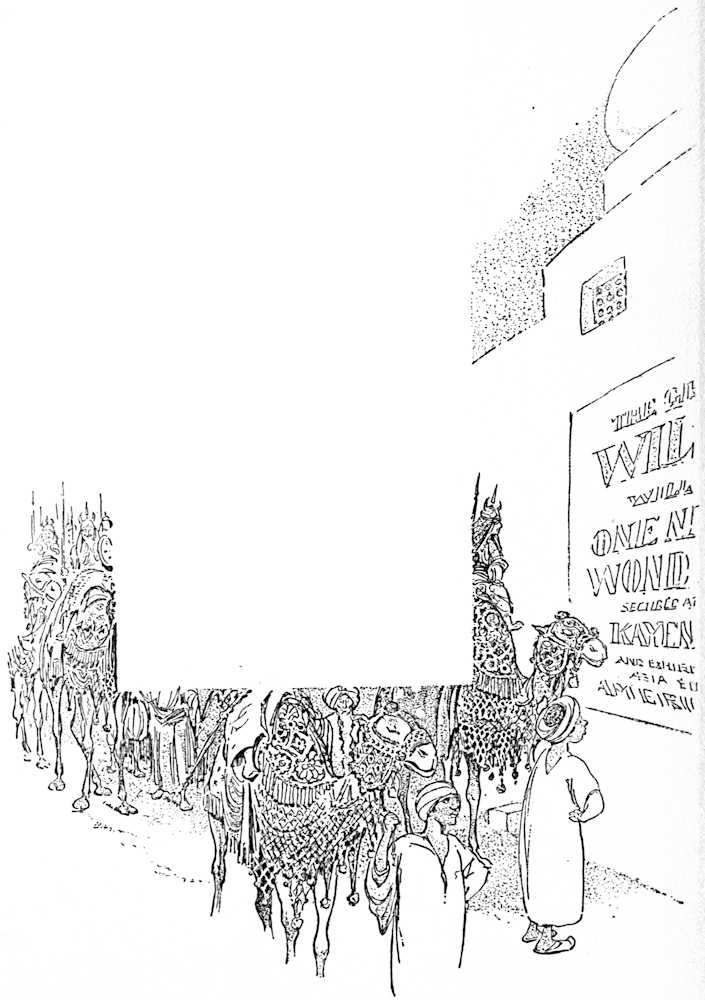
This sentence being communicated to the American, he fell at the feet of Kayenna, and begged as a dying request that his picture might be taken before execution. On being asked why he desired that[Pg 86] such a crime against the law of Moses as well as of Mohammed should be perpetrated, he only answered, in a somewhat incoherent fashion, “so that it might appear in the papers.”
“But knowest thou not,” said Kayenna, sternly, “that it is forbidden by thy law, as by ours, to make a graven image or likeness of any living thing?”
“O Lord!” wailed the unhappy man, “surely a newspaper picture does not come under that head! But take me away,” he added despairingly. “People who never heard of electrocution cannot be expected to appreciate electrotypes.”
So he was borne to his dungeon; and in a short time four stalwart slaves thrust him, along with the condemned traitor, into the mouth of the cave of the horrible two-headed Snake, there to suffer the most cruel death ever conceived of by mortal mind.
But mortal mind erred, at least for[Pg 87] once. On visiting the cave next morning, the executioners found not a trace of the two culprits, wherefore they supposed that the snake had despatched them promptly.
But the snake also was missing, and the closest search disclosed no explanation of his absence.
The mystery was partially solved when the caravan reached the capital of Nhulpar a few days later, and was confronted at the very gates of the city with flaming placards announcing that
THE GREAT AND ONLY WILKINS
ACKNOWLEDGED EMPEROR OF THE OPHIDIAN WORLD
WILL EXHIBIT
FOR ONE NIGHT ONLY
THE WONDROUS TWO-HEADED SNAKE
SECURED AT AN ENORMOUS EXPENSE FROM THE MENAGERIE
OF HER ROYAL HIGHNESS
KAYENNA THE GREAT
AND EXHIBITED BEFORE THE CROWNED HEADS OF ALL ASIA,
EUROPE, AND AFRICA
Prior to his Immediate Return to America
[Pg 88]
Kayenna was at first deeply incensed on reading those advertisements, and would fain have invoked the assistance of the King of Nhulpar to punish the culprit; but Shacabac sagely counselled her, saying: “Let it be. If the people of Nhulpar believe in this two-headed Snake, all the more will they reverence thee who art supposed to own others of the kind; and meanwhile the terror of thy name shall be spread throughout the earth. But [he added to himself] I would that I had the knave who defrauded me of my trusty yataghan, or[Pg 89] knew the secret whereby he made his cards fall as he willed. Great is Philosophy, and marvellous is Science; but miraculous is this thing which the Giaours call ‘Luck.’ Methinks it hath more to do with Science than with Philosophy. Would that the knave had stayed with me long enough to explain the strange mutations of that mysterious game which he calleth Po-kah!”
But ere this had come to pass, and while the caravan was crossing a sandy, waterless stretch of desert, Kayenna summoned the Sage to her side, and, smiling in a knowing way, asked, “Hast thou, in thy long experience, ever heard of a more difficult problem than that which confronts us, or a device whereby such a grave difficulty might be overcome?”
Shacabac had by this time conceived a profound respect for the genius of Kayenna; yet he could not imagine[Pg 90] any stratagem by which she might extricate herself and him and the fortunes of Ubikwi and Kopaul from the impending dilemma. “Nay,” he answered modestly, “I have heard of many, but of none so intricate as this. And I own that my heart weighs heavier with every step of our journey. Will not your Highness deign to tell her meanest slave how she purposes to carry us in safety to Nhulpar and home again, with our heads on our shoulders?”
“O Shacabac,” laughed Kayenna, “thou art only a man, after all, and a bachelor at that. Hast never heard of even a man’s outwitting another, not to speak of the endless resources of his superior, Woman?”
A little piqued at this sally, Shacabac replied: “Truly, I have known of some such; but they were all as child’s play compared with this coil. There was the case of the Ameer of Khali-Mazu,[Pg 91] who, being secretly envious of the great Sultan Djambhori, sought to compass his ruin by a gift of twoscore large and healthy elephants, the bare feeding of which for one twelvemonth would have emptied the royal exchequer. To have sold or given away the animals would have been a grave discourtesy.”
“That was rather a pretty dilemma,” admitted Kayenna. “How did Djambhori escape it?”
“He escaped it,” replied Shacabac, “by having the animals quietly despatched, and their tusks made into keys for twoscore grand pianos, the which he sent as presents to the wives of the Ameer, thus nobly revenging the wrong that had been done him. The Ameer, struck with remorse on perceiving the magnanimity of his foe, committed suicide shortly after the arrival of the pianos, and while the harem yet resounded with the practice lessons[Pg 92] of his devoted wives. The incident,” added Shacabac, “attracted much attention at the time, and led to the strict laws since passed against the importation of elephants and pianos into Khali-Mazu.”
“Verily, the device was ingenious,” commented Kayenna; “but it hardly matches what is required of us in a few days hence. Hast thou ever heard of a youth so situated that he could not fill any office in the land, yet rising to the highest, and that, too, without awakening the hostility of a single human being, notwithstanding the fierce jealousy which assails even those of lofty rank when they aim for rank yet higher?”
“Never,” answered Shacabac, “unless [bethinking himself of one remarkable exception]—unless it be that of Dar-Khos, a slave who once attained by a single stroke to boundless wealth, high rank, and length of days, merely[Pg 93] by refusing to obey the commands of his master, the great Sultan Al-Kali.”
“That sounds interesting,” said Kayenna; “and how did it happen?”
“In this wise,” responded Shacabac. “The Sultan and his slave, travelling without escort, came to a deep and wide river; and the Sultan ordered Dar-Khos to go forward and ford the stream. ‘Nay,’ answered the slave, with great humility, ‘the dog followeth his master.’ Being pleased with which reply, the Sultan plunged into the stream, and presently sank in a quicksand, so that naught of him was visible save only his turban, in which he had hidden, for greater security, the crown jewels and other valuables. These, with great difficulty, did Dar-Khos rescue, and by judiciously investing them was enabled to secure the nomination and election to the vacant sultanship. And the moral thereof is, A drowned man[Pg 94] dreadeth the water, but a wise one shunneth it from the beginning.”
“Thy tale is amusing,” commented Kayenna, “and the moral is as irrelevant as a moral should be; but both are far and wide from the purport of my question: How is a poor, weak woman to soothe the chagrin and placate the anger of two mighty monarchs, when they find that nature hath been greater than herself and they together?”
But Shacabac had naught to answer; for, indeed, the same problem had been puzzling his head for many days, and making that head seem to fit very loosely on his shoulders. It was a sad business all round; and he cursed the hour in which he had been tempted from his scholarly seclusion to aid in the wild schemes of a desperate woman; saying to himself, “A bird on toast is worth two on a bonnet,” which indeed is a truth that any child might comprehend.
[Pg 95]
Right royal was the welcome given to the caravan and its illustrious passengers on reaching the suburbs of the capital of Nhulpar. Imposing ranks of soldiery, horse and foot, lined both sides of the broad road for at least five miles without the gates. On entering the city, they found the streets carpeted with roses, hung on both sides with gorgeous banners, and canopied with evergreen arches spangled with flowers of every hue.
Before coming into the presence of the king, they were treated to a rare feast of intellect. First, a chorus of[Pg 96] ten thousand school-children, attired in white, sang a hymn of welcome, consisting of three hundred and forty stanzas, each replete with a tender thought or dainty conceit. Then followed an address from the chief men of the city, setting forth at much length the ancient friendship existing between the two nations,—a friendship which was now about to be cemented more firmly than ever. With great felicity and originality of thought the speaker pointed out that the people of Ubikwi and the people of Nhulpar were of the same origin, speaking the same language, that of Omar and Abdullah. “We must be friends,” he said, “for the sake of our common blood, our common language, and the common Koran which teaches us all. A quarrel between two such peoples would be a crime against humanity.”
If the speaker overlooked the fact that such crimes had been committed[Pg 97] once or twice already, with the enthusiastic consent of both parties, that was neither here nor there. The sentence was well turned, and that is enough to expect of a state oration.
Kayenna and her suite, most of them being mutes, listened with rare courtesy and patience to the addresses which followed; but Shacabac, who had not yet broken his fast,—and it was now high noon,—was visibly and audibly wearied by the ceremonies, and devoted one hundred and sixty-three pages of his inimitable diary to a scathing denunciation of the vice of prolixity.
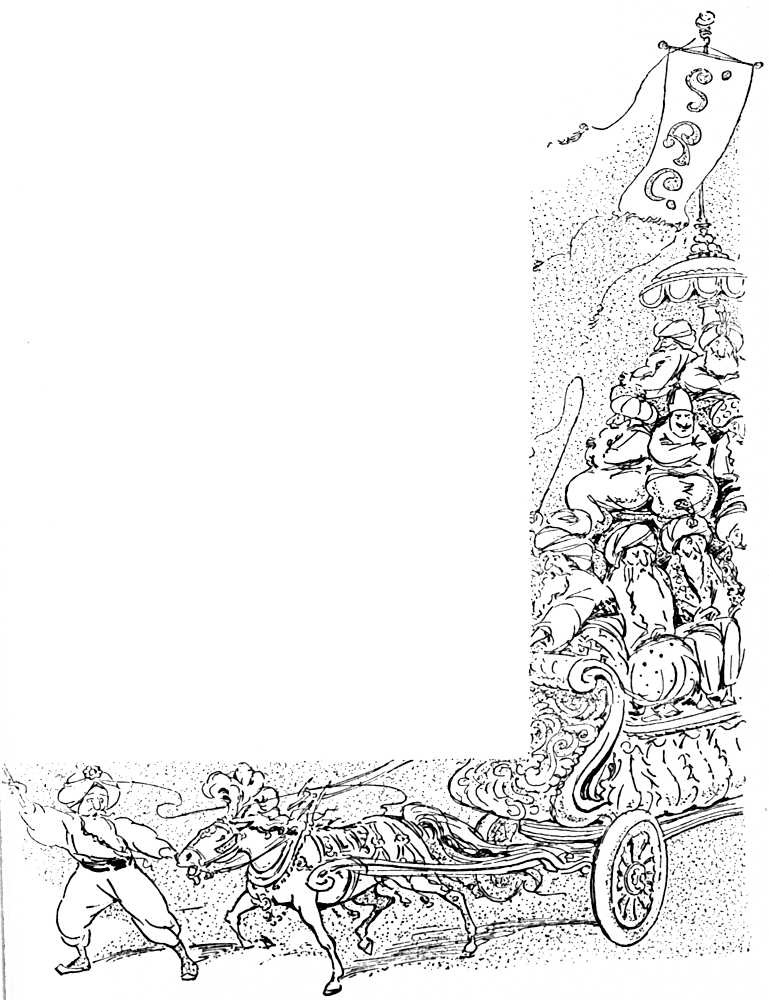
There were addresses from
The Incorporated Association of Muezzins;
The Imaum Brotherhood;
[Pg 98]
The Dancing Dervishes, who spoke as well as danced;
The Santon Society;
The Ancient Order of Arabian Knights, one thousand and one strong, each in turn relating a sprightly anecdote;
The Brethren of Backsheesh, numerous and influential;
The Camel Drivers’ Association;
The Fraternity of Water Carriers;
Thirty-two ex-presidents of the Society for the Prevention of Cruelty to Animals, seated in a beautiful chariot drawn by a cream-white pony;
Citizens generally.
Following these came interesting songs and recitations by local talent, all encored. Nor was the impatience of Shacabac relieved when a portly personage in spectacles was introduced by the presiding officer as “the far-famed and immortal Ben Haround, the Pauper Poet.”
[Pg 99]
“Truly, a tautological title,” murmured the Sage, as the bard, stepping forward, proceeded to unroll many lengths of an ode written for the occasion, or for any occasion, and respectfully dedicated to the illustrious Prince of Ubikwi. The verses, unfortunately, have not been preserved, notwithstanding that the Poet presented to Kayenna a copy beautifully woven in silk, and distributed among the throng several thousand other copies printed on a cheaper material. Ben Haround’s works had a large circulation during his lifetime; but his zeal in disseminating those gems of poesy kept him constantly poor, whence came his title of the Pauper Poet, to distinguish him from the opulent bards of other lands.
This being the first visit of the Ubikwians to Nhulpar, several youths in brazen armor, bearing tablets and writing instruments, pressed forward at this point, and, respectfully accosting the[Pg 100] strangers, begged to be informed regarding their “impressions of the country.”
Happily, at this juncture, the King himself rode up, and averted an international quarrel by ordering the indiscreet youths to be immersed in a caldron of brine for the next twenty-four hours. Then, courteously welcoming his guests, he gave order that the feast should be spread.
The King of Nhulpar sat at the head of the banquet table. On his left sat Kayenna; beside her the lovely daughter of the King, and at her side the child whom all believed to be the son of Muley Mustapha. Shacabac was awarded a place on the opposite side of the table, next to the favorite spouse of Nhulpar, the mother of the intended bride. Women are not commonly admitted to share in the feasts of state; but exception had to be made in the case of Kayenna, and the others[Pg 101] were allowed to keep her countenance,—a provision entirely unnecessary with her.
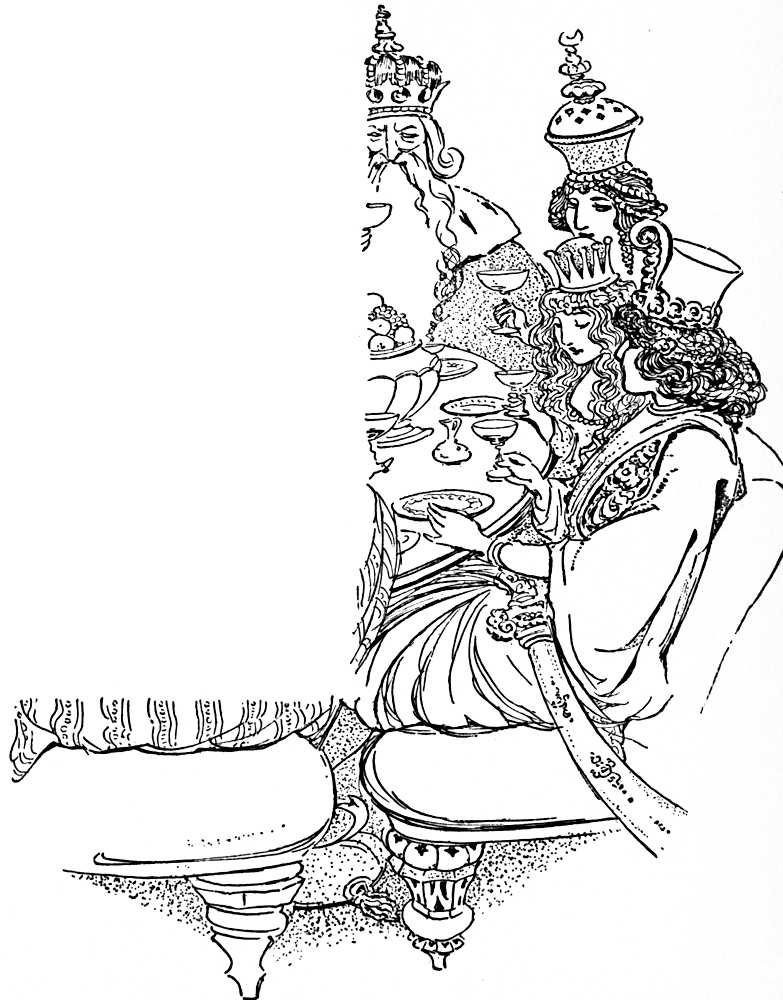
Shacabac vainly endeavored to catch her eye and signal a warning, when he perceived, to his dismay, that the Princess of Nhulpar was engaged in animated discourse with the potential cause of all future trouble, the Prince of Ubikwi, who, in truth, bore his assumed honors with becoming gallantry. Never, indeed, had a genuine prince carried himself with more debonair grace.
The illusion was perfect, so that even hardened, old courtiers exchanged[Pg 102] furtive winks and nudges, as who should say, “Our coming King hath a merry way with the women, and will not lose his bride for lack of brave wooing!”
Meanwhile Kayenna and the King kept up a gay conversation. The royal mother beamed approval on the young people, and indulged in the original remark to the Sage that “Heaven made and hath matched them,” whereat Shacabac, stifling a groan, smiled a courtier’s smile and murmured assent.
After the feast there were speeches, dignified, gracious, affectionate, and not too brief; but Shacabac had broken his fast, and feared naught that fate might bring until—until it brought the worst,—discovery, discomfiture and ruin.
“The nuptials will be celebrated at sunset,” said Kayenna to him as the wedding dinner ended, and the ladies retired to their apartments to prepare for the great festivities.
“But, Great Allah,” he exclaimed[Pg 103] in horror, “do you know what then? Unless something happens, we are lost,—thou, I, the gentle Princess, thy daughter”—
“Have no fear, good Shacabac,” she replied smilingly: “something will happen ere thou knowest it.” Again she smiled, the smile of confidence or of fatuity, he could not tell which, and moved away in the bridal train.
And something did happen,—something not down on the programme of King or Queen, Sage or Soothsayer. As the last of the retinue disappeared behind the hangings, a trumpet-blast was heard without the court, and a messenger, who had evidently ridden in hot haste, was admitted to the royal presence.
“Your Majesty,” he said, bending low, “I bring evil news. There is trouble in Ubikwi. The great Pasha Muley Mustapha is besieged in his palace by a rebel rabble, led by a scurvy[Pg 104] Soothsayer, and, unless help be sent to him forthwith, woe to him and his household, and to all the friends of Ubikwi!”
The King of Nhulpar, as we have said, was a warrior who loved the music of battle. The sound of clashing arms was sweet to his ears, and the savor of blood was as fragrance to his nostrils. The call to action came at an opportune moment; for the preparations of the past weeks had been a burden to his soul, which liked not the effeminate adjuncts of matrimony.
“Ha, sayst thou so?” he exclaimed. “Then, by the beard of the Prophet, thy words are welcome. I would fain see how this stripling, my son-in-law and heir to be, can bear himself in the lists of war. He seemeth over-confident in those of love, for one of such stern stuff as the King of Nhulpar should be. Here, slave, go to the apartments of the Prince of Ubikwi, [Pg 105]and say to him that the King beseeches his company on a pleasant joust. Bid the wedding guests await our return, which may be anon or later.”
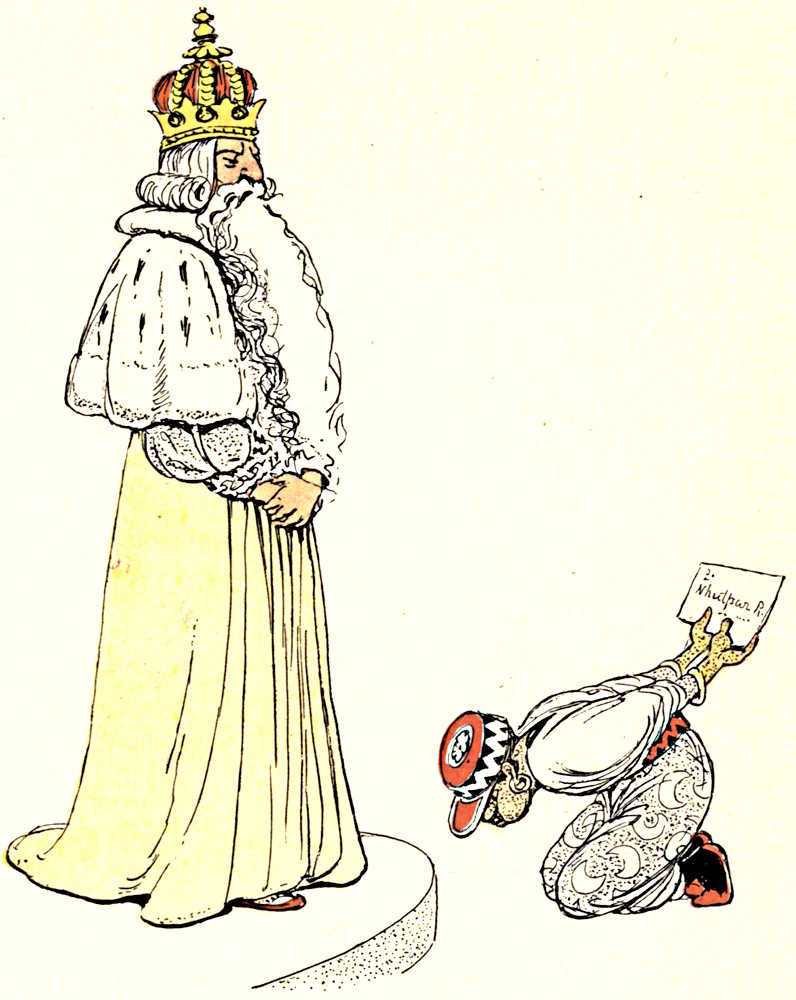
“‘I bring evil news’”
“Allah help our Kayenna now and her bantling!” exclaimed Shacabac to himself, as the warlike preparations went on. “I can but join the cavalcade, though little stomach have I for blows and blood. Nathless, I think that my head will be safer at Ubikwi than before the jaws of this battle-loving king. Verily, the sandal-maker should stick to his sandal-wood, and the man of wisdom to his preaching, leaving to fools the dangerous work of practising the same.”
[Pg 106]
Ben Haround.
The courier told only the truth. Dark and dangerous times had befallen poor old Muley Mustapha in his lonely palace of Ubikwi. For days he had wandered disconsolate through the zenana, missing the presence of Kayenna, which had ever been as the cooling east wind to his fevered brow; missing Shacabac, whose words of wisdom had so often wooed him to repose; missing Al Choppah and his diverting bowstring and scimitar that had enlivened many a long hour.
He did not miss little Muley; for, of a truth, he had seldom laid eyes upon[Pg 107] the offspring whom he unjustly blamed as the cause of all his woes. And now, when he strayed into the child’s sleeping-room, he noted with a shocked sense of the incongruous how it was decorated with the toys and the arms of virility,—ghastly relics of the futile attempt to deceive his people and the people of two greater nations!
“If she had never been born! If she had had the good taste to die any time during the past miserable eighteen years! If that villanous old Soothsayer”—
Here he was startled by a voice at his elbow,—“Your Highness was pleased to allude to me?”
It was the new Soothsayer, Badeg, looking, if possible, more impudently familiar than ever.
Muley Mustapha plucked up a spirit. “No, I was not alluding to you; though I was thinking of a villanous Soothsayer—an old one—who went to his reward[Pg 108] long ago. But what in the name of Eblis is it to you?”
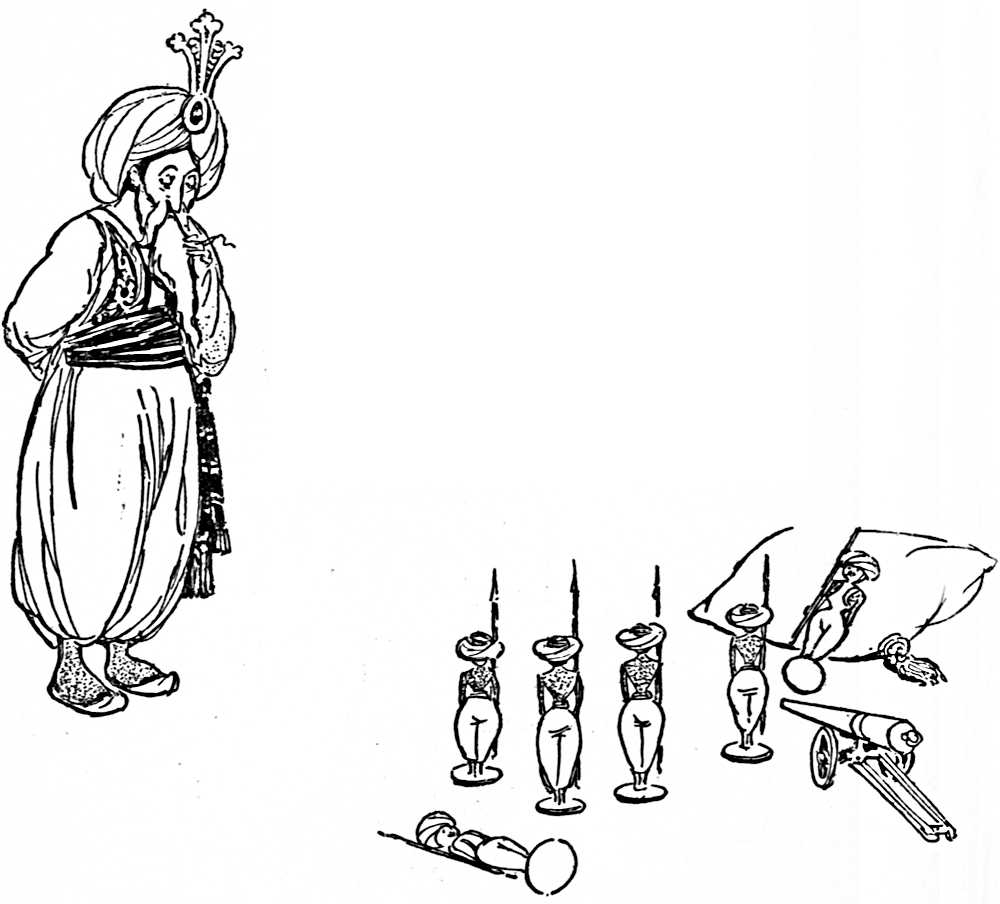
“Nothing,—oh, nothing,” was the bland reply. Then, after a pause: “Perchance your Highness was thinking of the great Astrologer Kibosh, who rose from the sorry condition of a beggarly carter to the highest favor in his master’s eyes because of a secret which he once discovered. He went to his reward many years ago, as your Highness hath said; but his secret died not with him, and it is said to be even more [Pg 109]wondrous than that possessed by the Wise Man who could change base metal into shining gold, inasmuch as the possessor of it hath no need to buy even the base metal, for”—here the speaker paused and looked significantly at the Pasha—“he findeth it right before him and ready to his hand.”
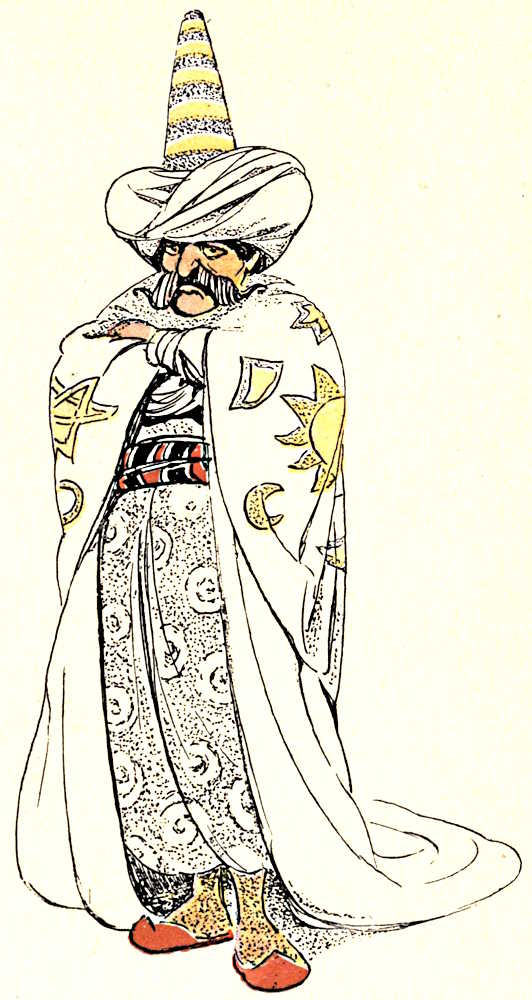
Badeg, the Soothsayer
Muley Mustapha, trying to dissemble and not succeeding very well, answered with assumed carelessness: “Truly, that must have been a remarkable man. I do not remember having heard of him before. What didst thou say he was when he led an honest life?”
“He was a poor carter,” replied the Soothsayer, “and, though he worked hard every day, and was very thrifty in his habits, yet he found himself growing poorer day by day and year by year. For he had a large family, consisting of seven sons and six daughters, whose respective ages were 13, 12, 11, 10, 9, 8, 7, 6, 5, 4, 3, 2, and 1. It was[Pg 110] no easy task to feed those thirteen jaws, or I should say pairs of jaws, without counting those of himself and his patient wife.
“Howbeit, it happened that Kibosh, on a certain Friday morning, awoke rejoicing that it was the day of rest, yet murmuring that, such being the fact, he knew there would be for him no work that day whereby to earn food for the morrow. He sat up in his couch, yawned, sighed, arose, and put on his garments. Then, after saying his morning prayers and making his scanty toilet, he sat down to a humble meal of black bread and dates. The bread was old and hard, and the dates were dry. Kibosh groaned as he chewed the uninviting food between his two-and-thirty teeth.”
“Had he two-and-thirty teeth?” interrupted the Pasha.
“Truly, he had no more,” replied the narrator. “It is the exact number[Pg 111] possessed by all men of ripe years, unless, indeed, they have lost one or more.”
“Then,” said the Pasha, “what was there remarkable in his having that number?”
“Nothing,” was the answer, in a tone of scarcely veiled impertinence. “Only I am telling the story; and I am trying to tell it in the only proper style, which is the Realistic. Is it your Highness’s wish that I proceed?”
“By all means,” said Muley Mustapha; “but, before going any further, how many hands had this Kibosh?”
“I was about to come to that,” returned the Soothsayer, tranquilly. “He had two hands, on each of which were one thumb and four fingers. He had likewise two feet, with five toes on each. This being a true story, I will not attempt to conceal the fact that he was furthermore blessed with two eyes, the like number of ears, one nose and[Pg 112] mouth, and as many hairs on his head and chin as might be; for these I did not try to enumerate.
“Having finished his frugal meal and smoked his chibouk, Kibosh went to the mosque, like a good Mussulman. His wife, the faithful Zaidee, remained at home. She had many things to do, attending to the wants of her numerous offspring, preparing the mid-day meal, and arranging the thousand little details of her house for the day. Moreover, she knew that her attire was hardly meet for the eyes of strangers. Her next-door neighbor, Ayesha, the wife of Hassan, the porter, had but the day before called on her, attired in a new yashmak, which was a sore trial to the patience of Zaidee, it having cost not less than fifty piastres at the bazaar kept by Solyman, the one-eyed Hebrew, opposite the fountain adjacent to the house of Amrou, the camel-driver.”
Here the Pasha, stifling a yawn,[Pg 113] asked wearily, “How many eyes didst thou say the Hebrew dog had?”
“One, your Highness. The other, I believe, was lost in consequence of—”
“It matters not how it was lost,” said the Pasha, hastily. “Allah be thanked, it was lost! and thy story hath some novelty. Go on.”
“For these reasons Zaidee remained at home while Kibosh went to the mosque. As it happened, he met on the way none other than his neighbor, the porter Hassan; and the two fell to talking of many things, such as the weather, the hardness of the times, and the great cost of bread and dates, and other such subjects.
“Even as they were speaking, they were accosted by a poor cripple, who beseeched alms of them in the name of Allah. ‘Alas!’ replied Kibosh. ‘I am but a poor man, with a large family, and can give thee naught save my prayers.’ But Hassan smiled a[Pg 114] little haughtily, and, pulling out his wallet, displayed it full of shining gold and silver pieces. As he saw the eyes of Kibosh fixed upon it in wonder, he hastily closed the wallet, and said, ‘I, too, am but a poor man,’ and gave the beggar naught. But, when they had passed on, Kibosh spoke to Hassan, saying, ‘O Hassan! but now thou didst complain of thy poverty; and, lo! thou hast a purse full of gold and silver.’
“‘It is not mine,’ said Hassan, in confusion: ‘it is my wife’s.’
“‘But thy wife is as poor as thyself,’ retorted Kibosh, severely; for he knew that Ayesha was only the daughter of old Cassim, the tent-maker, who was as poor as any man in the quarter, and indeed lived partly on the bounty of his son-in-law.
“‘Nay, then,’ said Hassan. ‘I will confess that I found this purse on the Square last week, and know not who its owner may be.’
[Pg 115]
“‘The Square,’ said Kibosh, ‘has been closed for the past ten days by order of the Caliph, as thou dost forget; and neither could any man enter it to lose or to find a purse. Hassan, thou art a prevaricator; and I must denounce thee to the Cadi as a thief unless—’
“‘Unless what, good neighbor Kibosh?’ cried Hassan, in terror. ‘Surely, thou wouldst not denounce and ruin thine old friend!’
“‘Nay,’ said Kibosh; ‘but I would first know how thou camest into possession of so vast a sum of money, and next I would ask thee for a loan of, say, one-half thereof.’
“Hassan thereupon, being in terror of his life, confided to Kibosh that he had become acquainted with a State Secret to divulge which would be disastrous, while so long as it remained unspoken it was a source of liberal revenue to him.
[Pg 116]
“As soon as Kibosh heard this, he said, ‘O Hassan, it is now some seventeen years, or maybe eighteen, that I have known thee and thy good wife, Ayesha, and thy father-in-law, Cassim, not to mention thy son Karib and thy daughter—’”
“Perish Kibosh and Hassan and all their tribe!” shrieked the Pasha, leaping to his feet. “Gehenna be their portion and thine, thou babbling impostor! What hath all this to do with me?”
“What hath it to do with thee?” answered the astrologer. “Much, very much, with thee and thine, and with the people of Ubikwi, and the people of Kopaul, and the people of Nhulpar, when they learn that the secret known to the dead Hassan (for he died very suddenly that same day) and confided to Kibosh (also an unhappy victim of Azrael’s visitation) is now my secret. Dost wish to hear it?[Pg 117] Or would your Highness prefer that I tell it in the market-place, that the child thou palmest off on the world as thy ‘son’ is really—”
Muley Mustapha was a meek man. His critics said behind his back that he was a hen-pecked man. The whole world knew that he was an old and feeble man. But the blood of Ali ran in his shrivelled veins; and it went boiling at the insolence of this red-headed beggar of a star-gazer, who dared beard him in his own harem. His hand leaped for his sword, and found only an empty scabbard; for the peaceable old Pasha had long ceased to carry the deadly scimitar, which he had once been wont to wield in the forefront of battle. His eyes fell upon the only weapon in sight, a razor (he afterward wondered what use there could have been for it in the harem); and, seizing it, he shouted in a voice of thunder, “Out of this, fortune-telling dog, liar,[Pg 118] and humbug, ere I cut the false tongue out of thy insolent throat!”
The Soothsayer fled from the palace in terror; but, on gaining the street, he found his voice again, and began shrieking aloud that the Pasha had become mad and was threatening the lives of all his friends.
“Know ye, O people of Ubikwi,” he shouted, “that the old man’s sins have found him out; and Heaven hath punished him by striking him with madness, because he hath sinned against the truth by passing off as his son a female child born unto him eighteen years ago!”
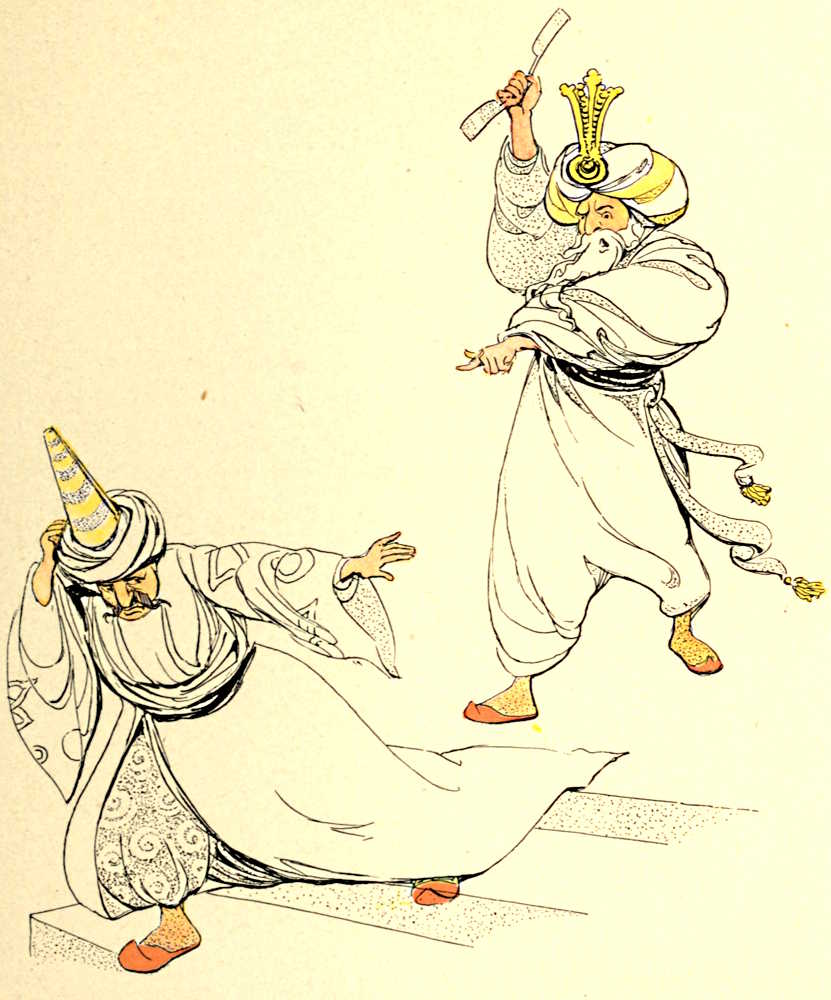
“‘Out of this, fortune-telling dog!’”
A large crowd was speedily attracted by the cries of the Soothsayer; and they began saying one to another: “Truly, this holy man cannot be mistaken. The child Muley hath more of the woman than of the man about him, and no eyes have ever seen him engaged in any manly sport.” And the [Pg 119]elders, prompted by insinuations previously sent out by the Soothsayer and his henchmen, began to remember that the former Soothsayer had disappeared mysteriously, together with the Physician, on the very day of little Muley’s birth.
Wherefore there arose a great clamor from the multitude assembled before the palace; and the old Pasha would have fared badly that day, had it not been for the prompt action of a veteran Mameluke and a dozen or two followers, who, riding out of the postern gate as if on patrol duty, set their horses, first at a gentle canter and then at a sharp gallop, right into the midst of the throng, speedily dispersing the unorganized crowd.
“Hark ye,” said the mustached Captain, as his Arabian charger reared on his haunches so that his fore feet almost touched the shoulders of the Soothsayer, who fell back some paces in[Pg 120] haste. “I know nothing of your stars or your prophecies; but this is the exercise ground of my troop, and you have spoiled our manœuvres to-day by being in the way. Next time we shall not abate our speed because of any dirty carcass in our path. Halt! Form fours! Trot! Gallop!” And down the esplanade at full speed and back again went the handful of horsemen, whose simple creed was obedience to orders.
Tradition hath it that the grim Captain of the troop was a renegade Christian, whose sole redeeming qualities were that he was loyal to the flag which he followed for the time, and that he dearly loved a fight.
The mob was, like all mobs, disconcerted at first by the organized force of a disciplined soldiery; and, after a few vain attempts to carry the palace by storm, it settled down to besiege and starve out the garrison,—a decision[Pg 121] which vastly pleased the Pasha and his Mameluke Captain, who shrewdly surmised that relief would not fail to come from some quarter if only delay could be gained. The palace was well supplied with provisions, for the Pasha loved good cheer and plenty of it. Could they but hold their own for a few weeks, the garrison might laugh at the efforts of the enemy.
[Pg 122]
When the mighty Sultan of Kopaul heard of the straits into which his son-in-law was driven, he lost no time in beginning to get ready to prepare to fly, metaphorically speaking, to his assistance. Age had somewhat chilled the ardor of his blood; and in this sudden crisis he sorely missed the counsels of his lamented spouse, Paprikah, from whom the wise Kayenna had inherited her rare firmness of character. In the course of many years of conjugal controversy he had learned to respect her vigorous intellect and fluency of expression; but, after her melancholy[Pg 123] loss, he seemed to lack in some degree the promptitude of action in emergency which had been so conspicuous a feature of his government during her lifetime. For this lack he made up by a fecundity and loudness of speech which impressed all who had not the happiness of his intimate acquaintance. With him, as he was wont to say, it was “a word and a blow.” His critics sneered that the terms were synonymous, but they did not understand the latent resources of the old warrior.
When the time for action came, he displayed his ability in a way that surprised them and all the world. In order not to be embarrassed by the presence of professional soldiers, who are ever an annoyance to an administration, he permitted a thousand of his veterans to proceed at once with Ben Zoin to the scene of action, and then set himself to the more serious work of planning a great and glorious campaign,[Pg 124] summoning for the purpose his Minister of War, in whom he had the highest confidence.
Between them they formulated a martial policy which had the unique distinction of being alike agreeable to themselves, to the army contractors, and even to the enemy. Some old-fogy soldiers, it is true, objected to it on the last ground; but as most of them died under its operation, their voices were not long heard.
A board of strategy, composed of eminent individuals who, having no experience, could have no prejudices in military affairs, resolved upon a line of action unprecedented in warfare. Three corps were mobilized and despatched, after due deliberation, to the scene of hostilities. The first consisted of raw levies, hastily organized, but ably officered by friends and relatives of the government, men who had distinguished themselves either by[Pg 125] political services or by meritorious consanguinity. The latter were, so to speak, “born” soldiers.
This first corps was sent to the front by a special caravan. Their arms and ammunition were forwarded, some time later, by a separate route. A third caravan, following yet another line of march, transported the food, tents, forage, and medical supplies.
By this ingenious arrangement the board of strategy had reason to trust that all three caravans might reach their destination in safety and good condition for effective work. “Divide and conquer” was the motto. If the soldiers should be captured, it was reasoned, their capture would be of no value to the enemy without the arms, provisions, and so forth, as would also the capture of the latter without the former.
Certain conservative persons, having a stake in the country, suggested that[Pg 126] it would be more prudent to keep the ammunition and commissariat trains at home until after the arrival of the troops at the front, so that nothing more valuable than lives might be lost in case of any disaster; but there are captious people who will criticise the wisest works of man, even historical works of the most transcendent merit, which a modest author may not name. The board of strategy, having a more than official interest in army contracts, disregarded such criticisms, saying, properly enough, that it were better to lose material which could be replaced, at government expense, than to hazard the prospects of future contracts. Wherein they showed a commendable forethought and put to shame their censors, who did not hold any contracts, present or prospective.
The Sultan had great confidence also in the reserves, composed of various military and civil organizations[Pg 127] distinguished for the splendor of their uniforms and the vociferousness of their patriotism in time of peace. As it happened, their reserve was so pronounced and shrinking in its character that it kept them from thrusting themselves to the front in time of war. Patriotic Orders, which had vowed to die for their country many a time, did not forget their vows when the dread ordeal came, but, on the contrary, with a fortitude unequalled in history, chose the most lingering death that a patriot might suffer, and voted unanimously to die of old age for the land which they loved so well and so wisely. For, as they truly said: The ignorant soldier goes and dies for his country, and thereby ends his usefulness to the country; but we who stay at home live to devote ourselves to the country’s service in any capacity, however lucrative. Bismillah! they were wise in their generation.
[Pg 128]
So it was that the mighty Sultan of Kopaul went to war vicariously, as all good sovereigns do, and, when it was over, asked for no greater reward than a seaport and coaling-station in the Sahara, where there was no sea and where a coaling-station was as superfluous as it would be in Gehenna. Ensued to his country much glory and a pension list, which was the wonder and the envy of the world; for, although the glory was evanescent, the pension list endured for generations, and the seaport and coaling-station served to “extend the sphere of Kopaulian influence,” and thus distribute the burden of taxes, even as a prudent merchant on the brink of bankruptcy enlarges the number and amount of his obligations, on the principle that in numbers there is safety.
[Pg 129]
The Captain of Mamelukes repented later that he had not given his charger the treat of trampling the internal economy out of the Soothsayer, when, on looking out of an embrasure of the palace, he descried a vast mob approaching, headed by the same Soothsayer, and brandishing every sort of nondescript weapon, while they shouted in angry tones: “Death to the False Pasha! Death to the Imposter who has deceived the People with a False Heir! Death to the foreign Mameluke who insults our Astrologer!”
[Pg 130]
“That means me,” said the Mameluke, grimly. “And it seems to mean business. I wish I had Ben Zoin and a dozen of his rough riders behind this gate to-day. By Allah! we’d teach those carrion to sing another song. What is your Highness’s wish?” saluting, as he spoke, the aged form of Muley Mustapha. “Shall we comply with the petition of your royal subjects, and offer them our heads as a guarantee of good faith? or let them come and take them, if they can?”
Muley Mustapha, for answer, only extended his hand, which the grizzled warrior took and kissed.
“I take it your Highness does not mean to part with his head for nothing?”
A new fire shone in the eyes of Muley Mustapha. “What my brave guard does, that and no less will I do,” he answered. “Let the dogs come on, if they dare!”
[Pg 131]
And the dogs came. Did ever a pack of hounds fear to face the wounded stag at bay? But dearly did they pay for their temerity.
For a full hour the unequal combat raged in front of the feeble gates of the palace. Foremost at every breach the bare white locks of Muley Mustapha were seen, as he wielded his trusty scimitar and hewed down, one after another, every foeman who dared face his flaming countenance. First in every sortie loomed the gigantic figure of the Captain of Mamelukes, who seemed to bear a charmed life, and to escape death by the very eagerness with which he courted it, as sometimes happens to champions in the milder domain of courtship and love.
Nevertheless, the fortune of war had gone ill with the dauntless few against the mighty force of numbers, had not assailants and assailed been startled, at the very crisis of the conflict, by the[Pg 132] loud notes of a bugle and the sound of tramping hoofs in the distant streets, whence presently there emerged, in the splendid panoply of war, a thousand of the body-guard of the Sultan of Kopaul, led on by Ben Zoin, the gallant champion of Ubikwi.
A ringing cheer went up from the worn defenders of the palace at sight of the relief. A wild cry escaped from the besiegers at the same; but the false Soothsayer, raising aloft a green banner, the Prophet’s sacred ensign, exhorted his followers to fight in the name of Islam. The fanatical appeal gave new heart to the rebels, so that not even the stout lances of Ben Zoin could have overcome the hostile array, had there not appeared at the further gate of the city a new cohort of cavalry, led by a plumed knight, whose face no man recognized, as he and his followers, with levelled spears, thundered on the rear of the rebel horde.
[Pg 133]
The rout of the besiegers was complete. The greater part threw down their arms and cried for quarter or sought safety in the alleys and lanes adjacent. The unknown did not draw rein until he was face to face with the Soothsayer, against whose neck he levelled the point of his lance.
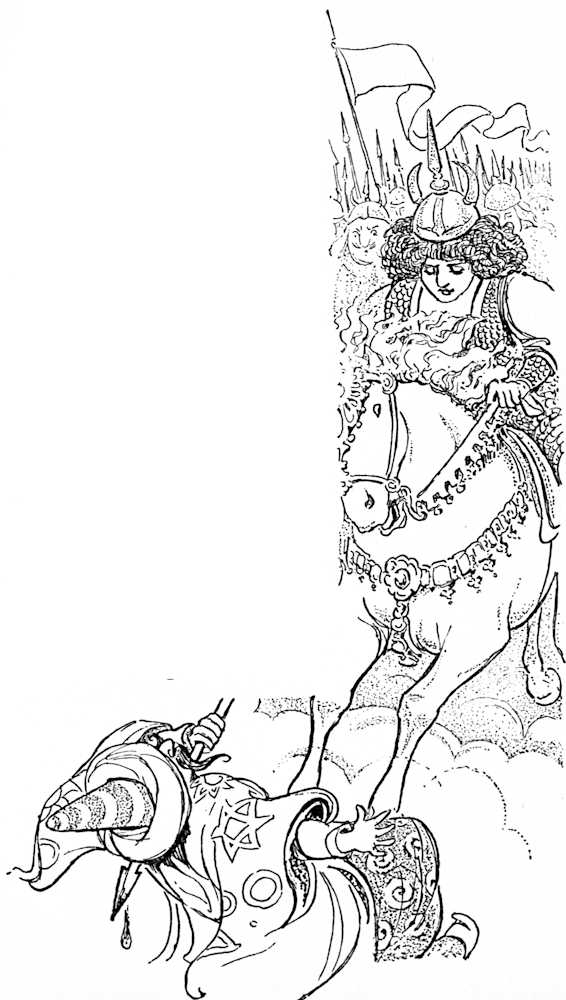
“By what right, thou scoundrel,” he thundered, “dost thou levy war on the just and mighty Pasha of Ubikwi? Answer, knave, ere my steel find an answer in thy throat!”
Thus forced into a corner, the insolent Soothsayer, trusting to his sacred[Pg 134] office, made answer: “By the right of my divine duty. I am a Soothsayer, and know that the Pasha of Ubikwi hath deceived his subjects and offended against high Heaven by palming off as his son the female child born to his house eighteen years agone.”
“And, by the divine right of my birth,” responded the knight, “I know thee to be a liar and a knave. Look at me. I AM PRINCE MULEY, born unto the house of my father eighteen years ago, and neither a female child nor a male impostor, like thee. Die, dog, with the lie in thy throat!”
With that he set spurs to his horse, and the point of his lance came out through the back of the Soothsayer’s neck. Whereat all the people cried out, as with one voice, “Long live Prince Muley, the son of his noble father, Muley Mustapha!”
But Muley Mustapha merely gasped in wonder, as not comprehending the[Pg 135] simple way in which the truth had been witnessed and error confuted,—as, indeed, a wiser man might have wondered, had he not been told the explanation given in the next and concluding chapter.
[Pg 136]
“I don’t think that I quite understand,” began Muley Mustapha, when he found himself alone with his gifted spouse for a few moments before dinner, and while the other dignitaries were pleasantly engaged in restoring tranquillity to the realm by superintending the decapitation of the disaffected.
“You mean that you don’t quite understand that you think,” interposed the good lady, sweetly. “Well, I will explain. The child whom you wickedly designed to bring up in a life of shame and turbulence was not, as you thought, a girl, but a boy!
[Pg 137]
“I determined, as I think I told you at the time, to save the innocent being from the contamination of a wicked world and the evil example of an unworthy sire. The Physician whom you ruthlessly put to death consented to the pious deception, for which I have ever revered his memory. He was a worthy man, and understood my nervous system better than any leech that I have ever known. Another kind of husband would have appreciated his merits, but let that pass. As for the old Soothsayer, he deserved his doom for lacking faith in his own predictions. I regret not his death. No government can be conducted safely unless its members be able to convince themselves and others that with them all wisdom dieth. Frequent changes of administration, save in favor of our own party, are disastrous to the welfare of any country.
“Henceforth place your trust in[Pg 138] me; and I will see to it that all official prophecies come out correctly, though it cost a new soothsayer every week.
“I leave you now,” she added, “to prepare my daughter-in-law for her bridal, and to instruct her in the proper way of managing a husband. I fear me much that the present Queen of Nhulpar is sadly lacking in decision of character. His Majesty the King, I am told, keepeth State secrets from her ears,—a great error on the part of a dutiful spouse.”
It was even as the good Kayenna had said. Young Muley Mustapha was a genuine Prince, with all his father’s old-time courage, re-enforced by a strain of firmness inherited from his noble mother. The rebel horde, who had taken up the false Soothsayer’s taunt that the youth was effeminate, no longer repeated the insult, partly because the lad had proved his manhood on the field, but chiefly because, after[Pg 139] Al Choppah had finished his work, not one of them was left to talk indiscreetly, nor, indeed, to talk at all.
Despite, or perhaps because of, the harem seclusion in which he had been reared, the youth was more than commonly free from bashfulness in the presence of women; and his own harem (for he did not copy his sire’s monogamous example) was ruled by him in right royal fashion. “In numbers is safety,” was his sagacious maxim. Yet, because of the mystery surrounding his youth, he was ever known throughout three kingdoms as “Her Majesty the King.”
When the aged Pasha went to his account, a few years later, everybody in official position said, as with one voice, that, with the exception of his illustrious successor, he was the wisest and best ruler that had ever reigned in Ubikwi. The same had been said of his sire and his grandsire and his greatgrandsire,[Pg 140] so that it was evident that virtue and wisdom were hereditary in that noble family, as they are in all reigning dynasties everywhere.
Kayenna lived to see her son mount successively the thrones of Ubikwi, Kopaul, and Nhulpar, and to supervise the education of a large and interesting family of children and grandchildren, dying at the last of a tetanus superinduced by the arduous labor of umpiring a debate on “Woman Suffrage.”
Shacabac lived to a ripe old age. Of his latter years his biographer says, “Allah had granted to him length of days and the divine faculty of repose, so that, while saying much, he thought but little, and worked hardly at all.”
When his mental faculties had become sufficiently impaired, the gallant King of Nhulpar appointed him Regius Professor of Political Economy in the National University,—a[Pg 141] position which he filled with great credit for many years. By his thoughtful lectures and essays, “Patriotism Another Name for Selfishness,” “A Nation’s Debt a Nation’s Wealth,” “Our Country always Wrong,”—and especially by his erudite monograph on “Finance,” so profound that not even the ablest minds could comprehend it,—his fame spread throughout all lands, and made him the envy of philosophers all over the earth. His stately monument bears the simple motto which governed him through life,—
“LOVE THYSELF: SO SHALL THY
AFFECTION BE RETURNED.”
[Pg 142]
When the great and good Shacabac had completed, as he thought, his incomparable book of Wisdom, he said to himself, “Here at last, is a perfect work of mortal man,” and went, none too humbly, to the venerable philosopher Woppajah, from whom he had imbibed his first draughts of knowledge. But the Master, after skimming a few lines and paying the tribute of a yawn, turned over the leaves until he came to the last chapter, when he pointed his finger to the number thereof, and, lo, it was the fatal number—thirteen!
Abashed at the silent rebuke, the[Pg 143] Sage would have withdrawn in confusion, but the good man bade him stay. “Let this,” he said, “be a lesson unto thee; and, that thou mayst ever be ready to extract the cork of hope from the demijohn of disappointment, and avert the debasing influence of superstition by always heading off an inauspicious omen, write now a fourteenth chapter and bestow it upon a grateful world, which ever rejoiceth to get something for which it hath paid naught.”
Rakkam, the tooth-puller, built up an enormous trade and grew in riches, by drawing two teeth for one price, and even though one of them were sound, the patient would boast that he was so much ahead, which meant out of his head.
It is a simple world and easily pleased. Ali-Kazam, the wise, when his partner said: “Here be three apples to divide between us twain, and[Pg 144] neither of us hath a knife to carve them withal,” merely replied, “Naught could be easier, my brother.” So saying, he ate one apple, and handing another to his partner, said, “Behold, we now have one apiece.” Thus was justice attained and wisdom rewarded.
Gratitude is one of the invertebrate virtues. It doth not crowd its more robust brothers out of the way in order to push to the front and assert itself obtrusively. Even when sought, it shrinks from notice, or modestly withdraws entirely from the field of action. Saped, a young man whose wisdom had not grown apace with his liver, once complained to a great physician that his head ached in the morning and that he had no desire to break his fast, adding, “I fear me that I must have eaten something that disagreed with me.” Now the physician could read the human face without glasses, and scanning the grapevine tendrils which[Pg 145] adorned the cheeks of the young man, he said, “Nay, I am sure it was not anything that you have eaten,” with a significant emphasis on the last word.
“But,” cried the youth, “it could not have been anything that I omitted to eat.” The physician, unheeding this remark, continued, “Henceforth, if you would escape headaches and other ills of the flesh, you must drink wine only at dinner.” The young man thanked him and went away, saying to the people that the physician had counselled him to dine all the time. But the physician was not grateful for the good report, nor was Saped any longer, after he had received the bill of the wise leech.
Many a man is grateful at being told a piece of news, until he is enjoined to keep a secret. Then doth it weigh like a millstone around his neck or a wife upon his knees.
Some are grateful, though possessing[Pg 146] neither wealth nor health nor high station, because they have had illustrious ancestors. It is a harmless kind of pride; for who would be cruel enough to ask them if such “descent” did not also imply degeneracy?
Many a man who never murmured at poverty complaineth loudly when he hath grown rich enough to be assessed for taxes.
When Adam was expelled for eating the apple he blamed “the woman.” She said naught, but years afterwards she invented pie; and the worst of these is apple-pie.
A conscientious publisher, who had printed an unauthorized edition of a great work (which modesty forbids mentioning here by name), was stricken with contrition some months afterwards, and wrote to the author saying: “Truly, kind Sir, I know that I have erred in publishing your invaluable work without leave, but, albeit there[Pg 147] is no legal obligation on me to recognize your interests, in the absence of any rational copyright law, yet my soul tells me that you have a moral right which may not be denied. Wherefore I have directed that a statement of account of sales be sent to you herewith. As you will perceive that the venture unhappily hath resulted in a loss, your remittance of a moiety thereof will be received by me with a gratitude which will go far toward allaying the pangs of a remorse-torn sinner.”
The prudent pirate burieth not his treasure in a remote cave or sandbank, but bestoweth it in the safety deposit vaults, for the day when he may have to face a stern but not implacable jury.
The truly good man may love his enemies; but it taketh a hermit, dwelling alone on an inaccessible island, to love his neighbors.
When the great Caliph Omar—may[Pg 148] his memory be forever blessed!—beheld the mountain of manuscripts heaped up in the Alexandrian Library, he asked, “Of what doth this Himalaya consist?” The Librarian, proudly waving his hand about, replied: “For the greater part, or say about ninety-five per centum, it consisteth of inestimable works of fiction based strictly upon the facts and so forth of History. They have all been selected from the best-selling nov—” But the Caliph, who had the gift of prophecy and could foresee even unto the present day, and perceived also that the folios were extremely dry, ordered that they be all fed to the furnaces of the baths, which had not been lighted for many moons because that the Egyptian tyrant, Kholrobba, had oppressed the people with a Fuel Trust. Allah is just, and the soul of Kholrobba suffered not from cold when it went home.
A conqueror’s hymn of thanksgiving[Pg 149] for victory needeth no wings. It reacheth its destination by the force of gravity.
And the paradox of gratitude is this: that the author is thankful if he know that the reader is not, when he beholds the mystic word in a foreign tongue,—
“FINIS.”
[1] A Creole word signifying the same as the Chinese “kum-shaw.”